

15 Other Words for “This Shows” in an Essay
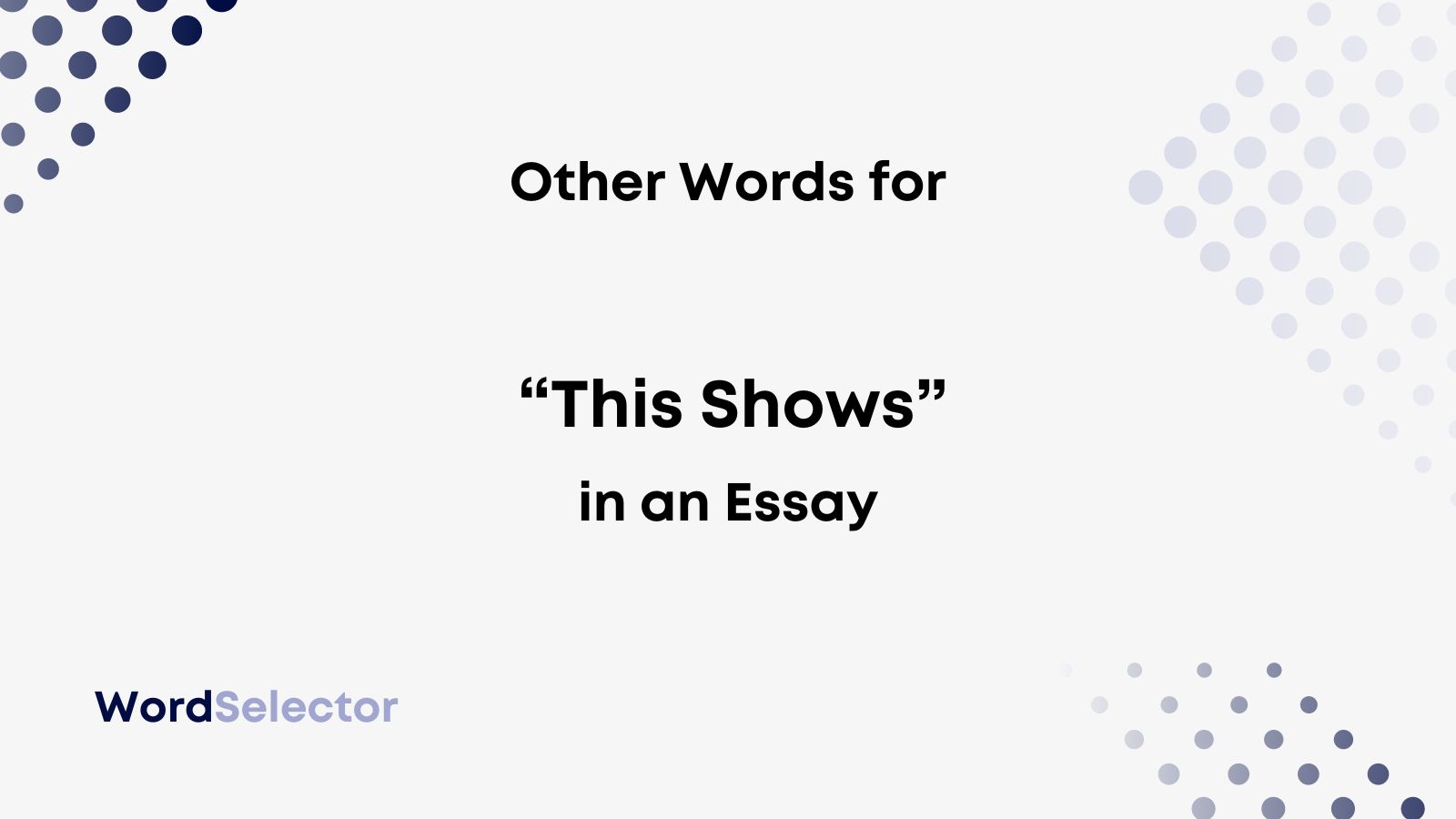
Are you worried about including “this shows” again and again in an essay?
After all, the last thing you want to do is sound repetitive and boring.
Fret not! You have found yourself in the right place.
This article will explore other ways to say “this shows” in an essay.
Other Ways to Say “This Shows”
- This demonstrates
- This indicates
- This implies
- This portrays
- This illustrates
- This establishes
- This proves
- This points to
- This highlights
KEY TAKEAWAYS
- “This shows” is a common phrase used in essays to demonstrate how one thing leads to another.
- “This demonstrates” is a great formal synonym that’ll help to spice up your academic writing.
- Try “suggesting” as an alternative that shows how one thing could have created another.
Keep reading to learn different ways to say “this shows.” We’ve covered the two best phrases to help you understand more about how you can improve your essays.
Alternatively, you can read the final section to learn whether it’s correct to write “this shows.” It’s appropriate to check this out before continuing to include it in your essay!
This Demonstrates
If you’re looking for words to use instead of “this shows” in an essay, try “this demonstrates.” It’s a great formal synonym that’ll help to spice things up.
It also comes with two options. You can use it at the start of a sentence as written:
This is option one. This demonstrates how to continue a thought from the previous sentence.
Or, you can include it as part of the same sentence. To do this, you should switch “this demonstrates” to “demonstrating.” For example:
This is option two, demonstrating that it’s part of the same sentence.
Either way, both are correct. The same applies to “this shows,” where you can use “showing” to include it in the same sentence.
It’s a great way to help the reader follow your process . This should make your essay much easier to read, even if the reader isn’t all that familiar with the topic.
You can also refer to these essay samples:
As you can see, we have also gathered all the necessary data. This demonstrates that we were correct about our original hypothesis.
They have created different rules for what we know. This demonstrates that they’re worried someone might try to interfere with them.
Also, you can write “suggesting” instead of “this shows.” It’s another great professional synonym that’ll help you to keep your writing interesting.
As we’ve already stated, you can use “suggesting” as part of the same sentence:
This is how it works, suggesting you can keep it to one sentence.
Or, you can switch it to “this suggests” to start a new sentence. For instance:
This is how it works. This suggests that you can create two sentences.
Both are correct. They also allow you to switch between them, giving you two options to help mix up your writing and keep the reader engaged .
Here are some essay examples if you still need help:
We have many new ideas ready to go, suggesting that we’re on the road to success. We just need more time.
This is the only way to complete the task, suggesting that things aren’t going to be as easy as we first thought.
Is It Correct to Say “This Shows”?
It is correct to say “this shows.” It’s a great word to use in an essay, and we highly recommend it when you’d like to show how one thing leads to another.
It’s a formal option, which is why it works so well in academic writing.
Also, it allows the reader to follow your thought process, which helps keep things streamlined and clear.
For instance:
Here is an example of how we can achieve this. This shows that we have considered every option so far.
“This shows” always starts a new sentence . You can use it whenever you’d like to connect back to the former sentence directly.
Also, makes sure you use “shows” as the verb form. It comes after “this,” so the only correct form is “shows.” To remind you, you can refer to these examples:
- Correct: This shows that things are supposed to work this way.
- Incorrect: This show that we know what we’re doing.
It’s worth using some extensions if you’re still looking to mix things up as well. Try any of the following:
- This evidence shows
- This picture shows
- This data shows
- This graph shows
- This study shows
Including something between “this” and “shows” allows you to be more specific . It helps direct the reader’s attention to something from the previous sentence.
- 11 Other Ways to Say “Thank You for Your Time”
- 14 Other Words for “Said” in an Essay
- 19 Gender-Neutral Alternatives to “Dear Sir or Madam”
- 15 Other Ways to Say “If I Can Be of Further Assistance”
We are a team of experienced communication specialists.
Our mission is to help you choose the right phrase or word for your emails and texts.
Choosing the right words shouldn't be your limitation!
© WordSelector

10 Other Ways to Say “This Shows” in an Essay
When writing essays, using the phrase “this shows” can get repetitive. It’s important to mix up your language to keep your reader engaged.
This article lists ten different ways to express the same idea, making your writing more interesting and varied. Each alternative is followed by explanations and examples to help you understand when and how to use them effectively.
Is “This Shows” a Good Phrase to Use in an Essay?
Using “this shows” in an essay can be beneficial, but it depends on the context. It’s a straightforward way to indicate that the information you are presenting supports your argument or helps explain your point. However, using this phrase repeatedly might make your writing seem less polished.
Here’s an example of how to use it:
Let’s weigh the pros and cons of using “this shows” in your writing.
- Clear and directly points out the significance of the evidence.
- Helps connect the evidence to your argument or thesis statement.
- Easy to understand and use.
- Can become repetitive if overused.
- Might seem too simple or lack sophistication in formal essays.
- Doesn’t offer variety in sentence structures.
While “this shows” is handy, you might want to consider alternatives, especially if you’re aiming for a more polished and varied writing style. Using synonyms or different phrases can add depth to your essay and keep your readers engaged.
Finding the right words to connect your ideas can make your essay shine. Here are ten alternatives to “this shows” that can help:
- This demonstrates
- This indicates
- This suggests
- This reveals
- This proves
- This establishes
- This confirms
- This supports
- This underscores
- This exemplifies
1. This demonstrates
This alternative is somewhat more formal than “This shows”, making it a good fit for academic essays. It implies a stronger link between evidence and assertion, suggesting a more thoughtful analysis. When comparing, “this demonstrates” carries an air of scientific precision or academic rigor, emphasizing the process of showing.
We recommend using “this demonstrates” when your evidence strongly supports your argument. It’s especially useful in contexts where you want to highlight thorough research or definitive proof. Think of situations where the connection between your examples and your main point needs to be unmistakable and grounded in professional analysis.
Here are a couple of examples:
2. This indicates
“This indicates” is a neutral phrase that fits well in both formal and informal essays. It’s less forceful than “this proves” but still shows a clear connection between evidence and conclusion. It’s like pointing something out rather than making an outright declaration.
Use “this indicates” when you want to suggest a conclusion rather than assert it definitively. It works well when you’re drawing inferences from data or observations, particularly in situations where there might be multiple interpretations.
3. This suggests
“This suggests” is an ideal choice for making gentle or speculative connections in your writing. It’s even less forceful than “this indicates”, perfect for when you’re presenting hypotheses or possibilities. It’s a polite way to introduce an idea that’s inferred rather than directly supported by the evidence.
This phrase is better suited for essays where you’re exploring potential outcomes or reasons, especially when direct evidence is not available. It’s also appropriate in informal contexts where maintaining a conversational tone is important.
4. This reveals
“This reveals” is powerful because it suggests uncovering or discovering something previously hidden. It’s perfect for when you want to highlight insights or findings that are unexpected or particularly enlightening. The phrase holds a bit of drama, making it great for engaging readers.
When your evidence uncovers new information or contradicts common assumptions, “this reveals” is an excellent choice. It’s well-suited for research papers or analytical essays where the goal is to bring new truths to light.
5. This proves
Among our list of synonyms, “this proves” is among the most assertive. It’s used to claim that the evidence conclusively supports your argument. Because of its strong implication, it’s best reserved for formal contexts where you have robust data or clear examples to back up your point.
This phrase is particularly effective in argumentative essays or research papers where establishing factual correctness is essential. It’s about as close as you can get to saying “this is irrefutable.”
6. This establishes
“This establishes” is similar in weight to “this proves” but with a slightly less aggressive tone. It suggests setting up a firm foundation for your argument or theory. This wording is especially useful in formal essays and academic writing where clarity and precision are paramount.
We recommend “this establishes” when you’re building up an argument step by step, and your evidence serves as a crucial piece of the puzzle. It shines in contexts where demonstrating the credibility or reliability of your claim is key.
7. This confirms
“This confirms” signals that your evidence directly supports or validates an existing theory or hypothesis. It’s less about revelation and more about verification, making it a professional choice for reinforcing your points in a formal essay.
It’s best suited for situations where you’re addressing anticipated outcomes or established theories. This alternative brings an air of finality and affirmation, particularly in scientific or analytical papers.
8. This supports
“This supports” is flexible, fitting nicely into both formal and informal contexts. It indicates that your evidence upholds your argument but does so in a way that’s less definitive than “this proves.” It’s akin to providing backup rather than claiming outright victory.
Use “this supports” when your evidence adds weight to your claim but might not be conclusive on its own. It’s particularly useful in essays where you’re piecing together support from various sources to form a cohesive argument.
See these examples:
9. This underscores
“This underscores” emphasizes the importance of a particular piece of evidence or point in your argument. It’s a way to highlight significance without asserting direct causation. This term is ideal for formal writing when you want to stress the weight of your findings.
This alternative is better suited when you need to draw attention to how crucial your evidence is to understanding your overall point. It’s like saying, “pay attention here, this is important.”
10. This exemplifies
“This exemplifies” is a sophisticated way to demonstrate how your evidence serves as a perfect example of your claim. It brings a touch of elegance to your writing, suitable for formal essays where showcasing examples is key to illustrating broader points.
Opt for “this exemplifies” when you have a clear, representative example that neatly encapsulates your argument or theory. It effectively tells your reader, “If you understand this example, you’ll grasp my larger point.”
Final Thoughts
Switching up the way you say “this shows” in your essays can make your writing stronger and more engaging. By using the ten alternatives we’ve discussed, you can clearly express your ideas and keep your reader’s attention. These phrases help you communicate more precisely and make your arguments more compelling.
Slava Velikiy, CEO of Rontar and GainRep, has over 20 years of experience in entrepreneurship, project management, and software development. Passionate about innovation and solving real-world problems, he shares his insights on entrepreneurship, leadership, and technology.
Similar Posts

10 Other Ways to Say “My Schedule Is Full”

10 Other Ways to Say “Thank You, Too”

14 Professional Ways to Say “Are We Still On?”

10 Other Ways to Say “In My Opinion”

How to Ask for Advice Politely (With Email Examples)

10 Professional Ways to Tell Someone They Talk Too Much

10 Other Words for “This Shows” in an Essay
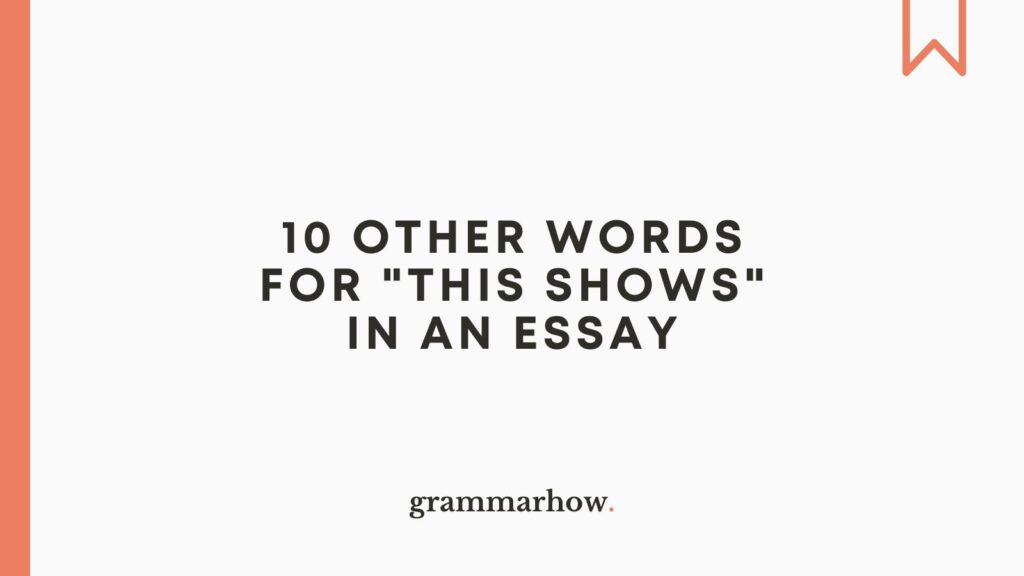
Showing how one thing affects another is great in academic writing. It shows that you’ve connected two points with each other, making sure the reader follows along.
However, is “this shows” the only appropriate choice when linking two ideas?
We have gathered some helpful synonyms teaching you other ways to say “this shows” in an essay.
- Demonstrating
- This implies
- This allows
- This displays
Keep reading to learn more words to replace “this shows” in an essay. You can also review the examples we provide under each heading.
Removing “this” from “this shows” creates a simple formal synonym to mix up your writing. You can instead write “showing” in academic writing to demonstrate an effect .
Typically, this is a great way to limit your word count . Sure, you’re only removing one word from your essay, but if you can find other areas to do something similar, you’ll be more efficient .
Efficient essays often make for the most interesting ones. They also make it much easier for the reader to follow, and the reviewer will usually be able to give you a more appropriate grade.
Check out these examples if you still need help:
- The facts state most of the information here, showing that we still have a lot of work to do before moving forward.
- This is the only way to complete the project, showing that things aren’t quite ready to progress.
2. Demonstrating
Following a similar idea to using “showing,” you can also use “demonstrating.” This comes from the idea that “this demonstrates” is a bit redundant. So, you can remove “this.”
Again, demonstrating ideas is a great way to engage the reader . You can use it in the middle of a sentence to explain how two things affect each other.
You can also review the following examples:
- These are the leading causes, demonstrating the fundamental ways to get through it. Which do you think is worth pursuing?
- I would like to direct your attention to this poll, demonstrating the do’s and don’ts for tasks like this one.
3. Leading To
There are plenty of ways to talk about different causes and effects in your writing. A good choice to include in the middle of a sentence is “leading to.”
When something “leads to” something else, it is a direct cause . Therefore, it’s worth including “leading to” in an essay when making relevant connections in your text.
Here are some examples to help you understand it:
- This is what we are looking to achieve, leading to huge capital gains for everyone associated with it.
- I would like to direct your attention to this assignment, leading to what could be huge changes in the status quo.
4. Creating
Often, you can create cause-and-effect relationships in your writing by including two similar ideas. Therefore, it’s worth including “creating” to demonstrate a connection to the reader.
Including “creating” in the middle of a sentence allows you to clarify certain causes . This helps to streamline your academic writing and ensures the reader knows what you’re talking about.
Perhaps these essay samples will also help you:
- We could not complete the task quickly, creating a problem when it came to the next part of the movement.
- I thought about the ideas, creating the process that we know today. I’m glad I took the time to work through it.
5. This Implies
For a more formal way to say “this shows,” try “this implies.” Of course, it doesn’t change much from the original phrase, but that doesn’t mean it’s ineffective.
In fact, using “this implies” (or “implying” for streamlining) allows you to discuss implications and facts from the previous sentence.
You will often start a sentence with “this implies.” It shows you have relevant and useful information to discuss with the reader.
However, it only works when starting a sentence. You cannot use it to start a new paragraph as it does not relate to anything. “This implies” must always relate to something mentioned before.
You can also review these examples:
- I appreciate everything that they did for us. This implies they’re willing to work together on other projects.
- You can’t always get these things right. This implies we still have a lot of work to do before we can finalize anything.
“Proving” is a word you can use instead of “this shows” in an essay. It comes from “this proves,” showing how something creates another situation .
Proof is often the most important in scientific studies and arguments. Therefore, it’s very common to use “proving” instead of “this shows” in scientific essays and writing.
We recommend using this when discussing your experiments and explaining how it might cause something specific to happen. It helps the reader follow your ideas on the page.
Perhaps the following examples will also help you:
- They provided us with multiple variables, proving that we weren’t the only ones working on the experiment.
- I could not figure out the way forward, proving that it came down to a choice. I didn’t know the best course of action.
7. This Allows
Often, when you talk about a cause in your essays, it allows an effect to take place. You can talk more about this relationship with a phrase like “this allows.”
At the start of a sentence , “this allows” is a great way to describe a cause-and-effect relationship . It keeps the reader engaged and ensures they know what you’re talking about.
Also, using “this allows” directly after expressing your views explains the purpose of your writing. This could show a reader why you’ve even decided to write the essay in the first place.
- Many scenarios work here. This allows us to explore different situations to see which works best.
- I found the best way to address the situation. This allows me to provide more ideas to upper management.
8. This Displays
It might not be as common, but “this displays” is still a great choice in academic writing. You can use it when discussing how one thing leads to another .
Usually, “this displays” works best when discussing data points or figures . It’s a great way to show how you can display your information within your writing to make things easy for the reader .
You can refer to these examples if you’re still unsure:
- We have not considered every outcome. This displays a lack of planning and poor judgment regarding the team.
- I’m afraid this is the only way we can continue it. This displays a problem for most of the senior shareholders.
9. Indicating
Indicating how things connect to each other helps readers to pay attention. The clearer your connections, the better your essay will be.
Therefore, it’s worth including “indicating” in the middle of a sentence . It shows you two points relate to each other .
Often, this allows you to talk about specific effects. It’s a great way to explain the purpose of a paragraph (or the essay as a whole, depending on the context).
If you’re still stuck, review these examples:
- There are plenty of great alternatives to use, indicating that you don’t have to be so close-minded about the process.
- I have compiled a list of information to help you, indicating the plethora of ways you can complete it.
10. Suggesting
Finally, “suggesting” is a word you can use instead of “this shows” in an essay. It’s quite formal and works well in academic writing.
We highly recommend using it when creating a suggestion from a previous sentence . It allows the reader to follow along and see how one thing affects another.
Also, it’s not particularly common in essays. Therefore, it’s a great choice to mix things up and keep things a little more interesting.
Here are a few essay samples to help you with it:
- You could have done it in many other ways, suggesting that there was always a better outcome than the one you got.
- I didn’t know what to think of it, suggesting that I was tempted by the offer. I’m still weighing up the options.

Martin holds a Master’s degree in Finance and International Business. He has six years of experience in professional communication with clients, executives, and colleagues. Furthermore, he has teaching experience from Aarhus University. Martin has been featured as an expert in communication and teaching on Forbes and Shopify. Read more about Martin here .
- 10 Better Ways To Write “In This Essay, I Will…”
- 10 Other Ways to Say “I Am” in an Essay
- 11 Formal Synonyms for “As a Result”
- 10 Other Words for “Said” in an Essay

Other Words for “This Shows” in an Essay
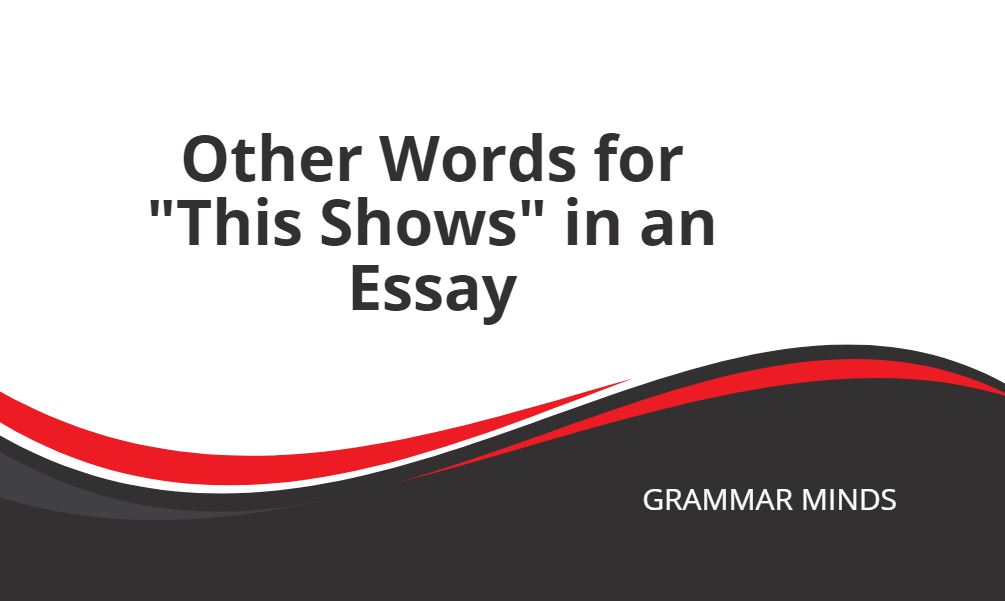
Are you looking for different ways to articulate evidence or analysis in your essay? “This shows” is a common phrase, but it’s helpful to have a variety of expressions to keep your writing engaging and precise.
Don’t worry; we’ve got all the alternatives you need. This article will explore various ways to say “this shows” in different contexts.
Other Words for “This Shows”
- This demonstrates
- This illustrates
- This reveals
- This indicates
- This signifies
- This highlights
- This suggests
- This implies
- This confirms
- This establishes
- This proves
- This exemplifies
- This underlines
- This validates
- This depicts
- “This shows” is a useful phrase to explain evidence or analysis.
- “This demonstrates” is effective for formal academic writing.
- Try using “this suggests” for a more analytical approach.
Keep reading to learn more about the most useful synonyms. In the following sections, we’ve touched on everything you need to know about the most effective ones.
Also, you can skip to the last section to learn more about “this shows.” In the final section, we explore whether it’s OK to use the phrase in the first place.
This Demonstrates (Formal)
“This demonstrates” is a formal synonym for “this shows.” It is often used in academic writing to explain how evidence supports a claim or theory.
Most of the time, you’ll use “this demonstrates” when you need to convey the significance of your evidence clearly. It helps to strengthen your argument and shows a higher level of analysis.
We think “this demonstrates” and “this shows” are just as effective as each other. You can use either (or both) in your writing to mix things up and show that you have a thorough understanding of your topic.
These examples will help you understand more about it:
- This demonstrates the importance of environmental conservation in modern society.
- This demonstrates that the hypothesis is supported by the experimental data.
This Suggests (Analytical)
“This suggests” is a more analytical synonym that works really well. You can use it when you want to imply a conclusion based on the evidence presented.
You’ll find it works best when you are discussing theories, hypotheses, or interpretations. “This suggests” allows you to introduce an inferred meaning without stating it as an absolute fact.
While it’s great for analytical writing, it’s not effective for stating clear-cut evidence. You should keep using “this shows” when you want to present straightforward conclusions.
Here are a couple of examples to help you:
- This suggests that there may be a correlation between diet and health outcomes.
- This suggests the possibility of alternative explanations for the observed results.
Is It Correct to Say “This Shows”?
“This shows” is correct and acceptable in writing. You can use it in both formal and informal contexts when you want to explain the significance of your evidence.
Most people use “this shows” to make their argument clear and direct. Therefore, you’ll often use it in essays, reports, and other academic writing.
Instead, it’s more common in general messaging or spoken settings when you need to talk about something else directly after your previous topic.
You should bookmark this page to remind yourself of all the synonyms for “this shows.” Then, you’ll always have something to refer to when you need more.

Joshua is a seasoned writer and language enthusiast at grammarminds.com, where he shares expert insights on grammar, writing techniques, and language mastery. Passionate about clear communication, Joshua helps readers sharpen their linguistic skills with ease.
Similar Posts
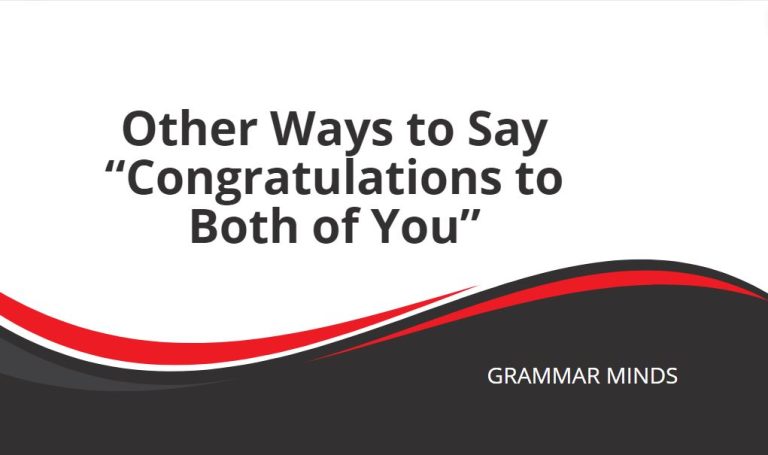
Other Ways to Say “Congratulations to Both of You”
Celebrating someone’s achievements or special moments can make them feel valued and appreciated. While “congratulations to both of you” is a heartfelt way to express…
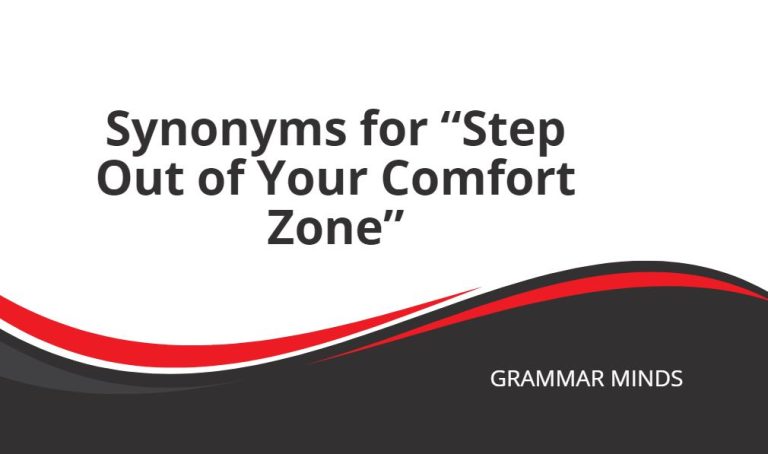
Synonyms for “Step Out of Your Comfort Zone”
You’re trying to describe someone who steps out of their comfort zone, right? Well, there are some other phrases you can use for stepping out…
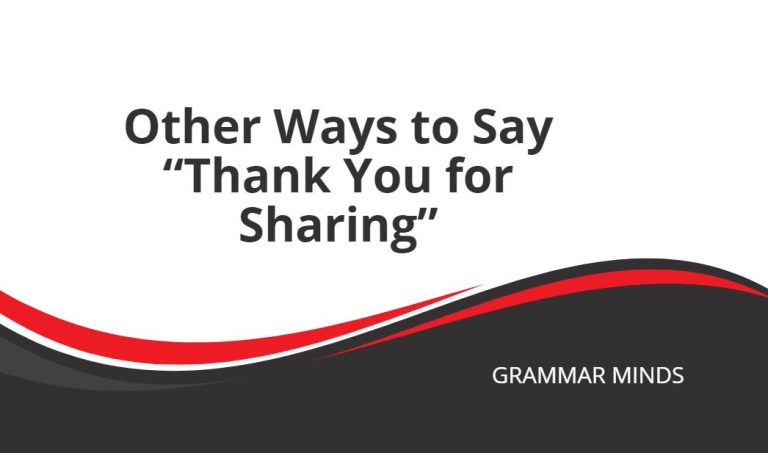
Other Ways to Say “Thank You for Sharing”
How do you convey your appreciation effectively? Is “thank you for sharing” sufficient? In this article, we’ll provide a list of possible alternatives you can…
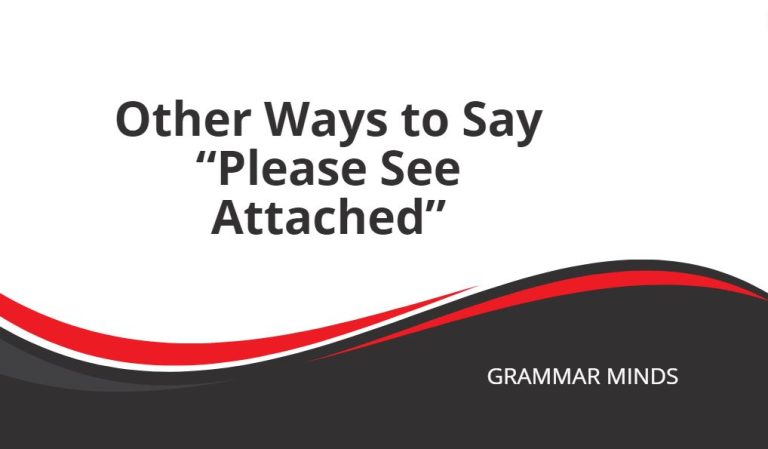
Other Ways to Say “Please See Attached”
Are you trying to direct someone’s attention to an attachment in your email? “Please see attached” is a good way to do that, but is…
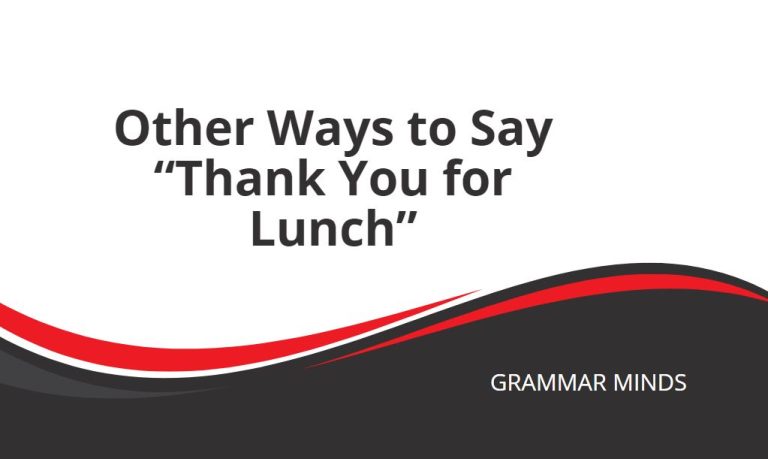
Other Ways to Say “Thank You for Lunch”
Appreciating someone for treating you to lunch is very important, especially in professional and personal environments. How do you convey your appreciation effectively? Is “thank…
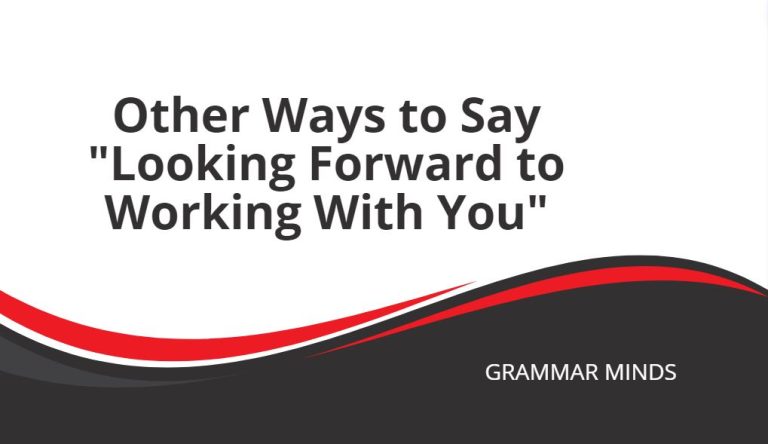
Other Ways to Say “Looking Forward to Working With You”
Writing formal emails is tricky. How do you let someone know, in a professional way, that you are looking forward to working with them? If…
Leave a Reply Cancel reply
Your email address will not be published. Required fields are marked *
Save my name, email, and website in this browser for the next time I comment.

12 Other Words for “This Shows” in an Essay
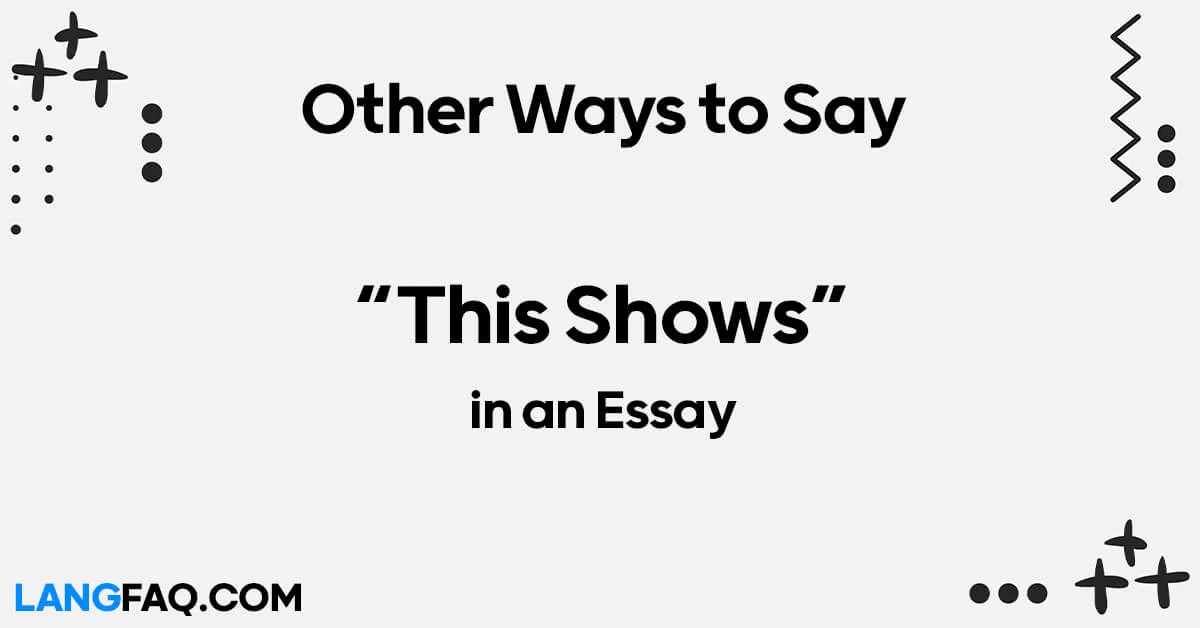
Share this post:
Embarking on the journey of expressive writing requires the adept use of language . Unveiling alternative phrases for “This Shows” can transform your essays into compelling narratives. In this article, we delve into 12 distinctive expressions, enhancing your ability to articulate thoughts with finesse. Let’s embark on this linguistic exploration.
12 Other Words for “This Shows”
Here are 12 alternative expressions for “This Shows”:
- Demonstrates
- Illustrates
- Exemplifies
Here’s a table with meanings and examples for the 12 alternative expressions for “This Shows”:
| Alternative Expression | Meaning | Example |
|---|---|---|
| Evidently | Clearly and unmistakably | The data EVIDENTLY indicates a significant upward trend. |
| Demonstrates | Clearly shows or proves | The experiment DEMONSTRATES the effectiveness of the method. |
| Illustrates | Provides a clear example or picture | The graph ILLUSTRATES the correlation between variables. |
| Reveals | Unveils or brings to light | The investigation REVEALS new insights into the matter. |
| Displays | Exhibits or showcases | The art gallery DISPLAYS a stunning collection of paintings. |
| Manifests | Clearly shows or embodies in a tangible way | His dedication MANIFESTS in the consistent quality of work. |
| Portrays | Represents or describes in a particular way | The movie PORTRAYS the harsh realities of urban life. |
| Exemplifies | Serves as a typical example or illustration | The successful entrepreneur EXEMPLIFIES . |
| Conveys | Communicates or expresses | The speaker CONVEYS the urgency of addressing climate change. |
| Signifies | Indicates or represents something specific | The ringing bell SIGNIFIES the end of the school day. |
| Exhibits | Displays or presents | The museum EXHIBITS artifacts from ancient civilizations. |
| Indicates | Points out or shows a particular direction | The compass INDICATES the way to the north. |
These alternative expressions provide a rich tapestry of language to convey ideas effectively in writing. By diversifying your vocabulary, you can add nuance and depth to your communication, ensuring that your message resonates with clarity and impact.
Is It Correct to Say “This Shows”?
Certainly, using the phrase “This shows” is grammatically correct, and it’s a commonly employed expression in writing and speaking. However, to enhance the variety and sophistication of your language, you might consider incorporating alternative expressions for greater impact.
The phrase “This shows” is straightforward and direct, making it suitable for various contexts, from academic writing to everyday communication. It efficiently conveys the idea that something is being demonstrated or revealed. For example:
- “The data analysis is thorough, and this shows the researcher’s attention to detail.”
- “She consistently meets deadlines, and this shows her commitment to the project.”
While grammatically correct, it’s beneficial to diversify your vocabulary to prevent repetition and add nuance to your expression. Utilizing alternatives such as “demonstrates,” “illustrates,” “reveals,” or any of the other suggested terms in this article can elevate the quality of your writing, providing a more varied and sophisticated linguistic palette.
Professional Mail Example With “This Shows”
Subject: Project Progress Update – Milestone Achieved
Dear [Recipient’s Name],
I trust this email finds you well. I am writing to provide you with an update on the current status of the project.
We have successfully completed the initial phase of the project, and I am pleased to inform you that our team’s collective efforts have borne fruit. This shows the dedication and commitment we have invested in ensuring the project’s success .
To delve into specifics, the data analysis, as outlined in our project plan, has been meticulously executed. The comprehensive report generated from this analysis not only meets but exceeds the expected standards. This shows our attention to detail and commitment to delivering quality outcomes.
Moreover, our collaborative approach with the cross-functional teams has significantly contributed to the seamless progression of tasks. This shows the effectiveness of our teamwork and the positive impact it has on project timelines.
In the coming weeks, we are poised to enter the next phase, building upon the solid foundation laid during this initial stage. We are confident that the momentum we’ve gained will propel us toward meeting and even surpassing our project objectives.
I welcome any feedback or suggestions you may have as we proceed. Your insights are invaluable to us, and we are committed to ensuring the project aligns with your expectations.
Thank you for your continued support and trust in our team’s capabilities. We look forward to achieving further milestones together.
Best regards,
[Your Full Name] [Your Position] [Your Contact Information]
1. Evidently: A Clear Path to Clarity
“Evidently” is an adverb used to convey a clear and unmistakable indication of a situation or fact.
In formal writing, “evidently” can enhance the expression of certainties or observations without leaving room for doubt. In informal contexts, it adds a touch of confidence to casual conversations.
Formal: The research data EVIDENTLY supports the hypothesis, showcasing a significant correlation between variables.
Informal: EVIDENTLY, she has a talent for turning challenges into opportunities.
Email Sample:
Subject: Evidently Successful Project Results
Dear [Recipient],
I hope this message finds you well. I am pleased to inform you that our recent project has EVIDENTLY exceeded expectations. Attached is a detailed report for your review.
Best regards, [Your Name]
- Formal Variation: It is EVIDENT FROM THE ANALYSIS that our strategy is effective.
- Informal Variation: EVIDENTLY, you aced that presentation!
Using “evidently” brings an air of authority to your statements, making it suitable for professional communication where clarity is paramount.
2. Demonstrates: Showcasing Excellence
“Demonstrates” is a verb indicating a clear and conclusive presentation of a concept, skill, or fact.
In formal writing, “demonstrates” is powerful for illustrating achievements or capabilities. In casual settings, it can highlight personal skills or achievements.
Formal: The experiment DEMONSTRATES the effectiveness of the proposed solution.
Informal: He DEMONSTRATES exceptional leadership in every project.
Subject: Demonstrates Strong Leadership
I wanted to bring to your attention how [Name] consistently DEMONSTRATES exceptional leadership skills in our team. His recent contributions have been noteworthy.
- Formal Variation: The report DEMONSTRATES the company’s commitment to sustainability.
- Informal Variation: She DEMONSTRATES creativity in every design.
“Demonstrates” adds weight to your assertions, making it ideal for showcasing accomplishments in professional and personal contexts.
3. Illustrates: Painting Pictures with Words
“Illustrates” is a verb conveying the creation of a clear and vivid picture through words, often used to explain or clarify.
Formally, “illustrates” is potent for elucidating complex concepts. In informal communication, it lends a creative flair to storytelling.
Formal: The graph ILLUSTRATES the correlation between input and output variables.
Informal: Let me ILLUSTRATE my point with a personal anecdote.
Subject: Illustrates Our Progress
The attached report ILLUSTRATES the remarkable progress we’ve made this quarter. Feel free to reach out if you have any questions.
- Formal Variation: The case study ILLUSTRATES the effectiveness of the proposed strategy.
- Informal Variation: His experience ILLUSTRATES the power of resilience.
“Illustrates” is a versatile term, suitable for both technical explanations and adding a storytelling element to your conversations.
4. Reveals: Unveiling Truths
“Reveals” is a verb indicating the disclosure or exposure of something previously hidden or unknown.
In formal contexts, “reveals” is impactful for unveiling discoveries or insights. Informally, it adds a dramatic touch to everyday storytelling.
Formal: The investigation REVEALS new dimensions in our understanding of the phenomenon.
Informal: Guess what the interview REVEALS about his unconventional career path!
Subject: Reveals Key Findings
The attached document REVEALS key findings from our recent market analysis. Your insights on this matter would be valuable.
- Formal Variation: The research REVEALS a previously unknown correlation.
- Informal Variation: This documentary REVEALS the hidden gems of our city.
“Reveals” adds a touch of intrigue to your narrative, making it suitable for both professional revelations and casual storytelling.
5. Displays: Showcasing for Impact
“Displays” is a verb indicating the presentation or exhibition of something for observation or admiration.
In formal writing, “displays” is apt for showcasing achievements or results. Informally, it adds flair to expressing personal accomplishments.
Formal: The conference room DISPLAYS a collection of awards highlighting our achievements.
Informal: She DISPLAYS a remarkable level of dedication to her craft.
Subject: Displays of Excellence
Our team consistently DISPLAYS excellence in every project. Please find the attached report for your review.
- Formal Variation: The showroom DISPLAYS the latest innovations in technology.
- Informal Variation: He DISPLAYS unmatched passion for his hobbies.
“Displays” emphasizes visibility and impact, making it suitable for professional and personal contexts, especially when showcasing accomplishments.
6. Manifests: Bringing Ideas to Life
“Manifests” is a verb signifying the clear and tangible expression or demonstration of an idea, quality, or feeling.
In formal settings, “manifests” is potent for portraying tangible outcomes. Informally, it adds a touch of vividness to personal narratives.
Formal: His dedication MANIFESTS in the consistent quality of work delivered.
Informal: The team spirit MANIFESTS in our successful collaborations.
Subject: Manifests Exceptional Performance
I wanted to highlight how [Name]’s effort MANIFESTS in the exceptional performance of our recent project. Please find the details attached.
- Formal Variation: The initiative MANIFESTS the organization’s commitment to sustainability.
- Informal Variation: His kindness MANIFESTS in the little things he does for others.
“Manifests” adds a layer of tangibility to your descriptions, making it suitable for both professional and personal contexts, especially when emphasizing dedication or commitment.
7. Portrays: Crafting a Narrative
“Portrays” is a verb conveying the representation or depiction of something through words, images, or actions.
Formally, “portrays” is effective for creating a narrative or analysis. Informally, it adds a storytelling element to personal anecdotes.
Formal: The movie PORTRAYS the harsh realities of urban life.
Informal: Let me PORTRAY a scene from my recent travel adventure.
Subject: Portrays Our Brand Identity
I trust this message finds you well. The attached document PORTRAYS our brand identity and the values we hold dear.
- Formal Variation: The report PORTRAYS the evolving landscape of our industry.
- Informal Variation: His artwork beautifully PORTRAYS the essence of nature.
“Portrays” invites readers to visualize, making it suitable for both analytical writing and creative storytelling.
8. Exemplifies: Setting a Standard
“Exemplifies” is a verb indicating the action of serving as a typical example or illustration of a concept or quality.
In formal writing, “exemplifies” is powerful for setting standards or showcasing ideal scenarios. Informally, it adds a touch of admiration to personal narratives.
Formal: The successful entrepreneur EXEMPLIFIES resilience and adaptability.
Informal: She truly EXEMPLIFIES the meaning of generosity.
Subject: Exemplifies Excellence
I am delighted to share how [Name] consistently EXEMPLIFIES excellence in their role. Please find the details attached.
- Formal Variation: The project EXEMPLIFIES the organization’s commitment to innovation.
- Informal Variation: Your dedication EXEMPLIFIES true friendship.
“Exemplifies” adds a layer of admiration to your descriptions, making it suitable for both professional and personal contexts, especially when highlighting exemplary qualities.
9. Conveys: Communicating with Precision
“Conveys” is a verb indicating the clear and effective communication of an idea, feeling, or information.
In formal writing, “conveys” is essential for emphasizing effective communication. Informally, it brings a touch of intention to casual conversations.
Formal: The speaker CONVEYS the urgency of addressing climate change in his presentation.
Informal: She CONVEYS her excitement for the upcoming event through animated gestures.
Subject: Conveys Key Messages
The attached document CONVEYS the key messages from our recent meeting. Your feedback is highly appreciated.
- Formal Variation: The artwork CONVEYS the artist’s commentary on societal issues.
- Informal Variation: His smile CONVEYS a sense of genuine happiness.
“Conveys” adds a layer of intention to your communication, making it suitable for both formal presentations and casual expressions.
10. Signifies: Indicating Importance
“Signifies” is a verb indicating the action of conveying meaning, importance, or intention.
Formally, “signifies” is potent for indicating significance. Informally, it adds depth to expressions of importance or intent.
Formal: The ringing bell SIGNIFIES the end of the school day.
Informal: Their shared laughter SIGNIFIES a strong bond.
Subject: Signifies Milestone Achievement
I am thrilled to share that our recent accomplishment SIGNIFIES a significant milestone for the team. Please find the details attached.
- Formal Variation: The decision SIGNIFIES a strategic shift in our approach.
- Informal Variation: Your support SIGNIFIES a lot to me.
“Signifies” adds gravitas to your descriptions, making it suitable for both formal announcements and personal expressions of importance.
11. Exhibits: Showcasing for Inspection
“Exhibits” is a verb indicating the action of displaying or presenting something for observation or inspection.
In formal contexts, “exhibits” is potent for showcasing achievements or qualities. Informally, it adds flair to expressing personal accomplishments.
Formal: The museum EXHIBITS artifacts from ancient civilizations.
Informal: He always EXHIBITS a positive attitude, no matter the circumstance.
Subject: Exhibits Exceptional Skills
I am pleased to inform you that [Name] consistently EXHIBITS exceptional skills in project management. Please find the details attached.
- Formal Variation: The gallery EXHIBITS a diverse collection of contemporary art.
- Informal Variation: His personality EXHIBITS warmth and kindness.
“Exhibits” emphasizes visibility and impact, making it suitable for professional and personal contexts, especially when showcasing accomplishments.
12. Indicates: Pointing Towards Understanding
“Indicates” is a verb indicating the action of pointing out or showing a particular direction, meaning, or result.
In formal writing, “indicates” is crucial for pointing towards insights or findings. Informally, it adds a touch of direction to casual conversations.
Formal: The compass INDICATES the way to the north.
Informal: His expression INDICATES genuine interest in the topic.
Subject: Indicates Project Progress
The attached report INDICATES significant progress in our ongoing project. Your thoughts on this matter would be valuable.
- Formal Variation: The data INDICATES a positive trend in customer satisfaction.
- Informal Variation: Your gesture INDICATES a caring attitude.
“Indicates” adds precision to your descriptions, making it suitable for both formal reports and casual expressions of direction.
Q: How can I seamlessly incorporate these alternatives into my essay? A: Integrate these alternatives based on the context of your writing. Experiment with each to discover which resonates best with your style.
Q: Is it necessary to use all 12 alternatives in one essay? A: No, select alternatives based on relevance and variety. Using a mix adds depth to your writing without overwhelming the reader.
Q: Can these alternatives be applied to any type of essay? A: Absolutely! Whether it’s a persuasive piece or an informative essay, these alternatives enhance expression in various contexts.
Q: Why is expressive writing important in essays? A: Expressive writing captivates readers, making your essay memorable. It adds a personal touch, fostering a connection between the writer and the audience.
Q: Are these alternatives suitable for academic essays? A: Yes, these alternatives elevate the quality of academic writing, making your essays more engaging and impactful.
Q: How do I avoid overusing these alternatives in my essay? A: Use a mix of alternatives and vary your language to maintain a natural flow. Overusing any term can diminish its impact.
Mastering alternative expressions for “This Shows” is a transformative step in refining your essay-writing skills. The nuances offered by these alternatives open new avenues for expression, ensuring your essays stand out with clarity and impact.
Similar Posts
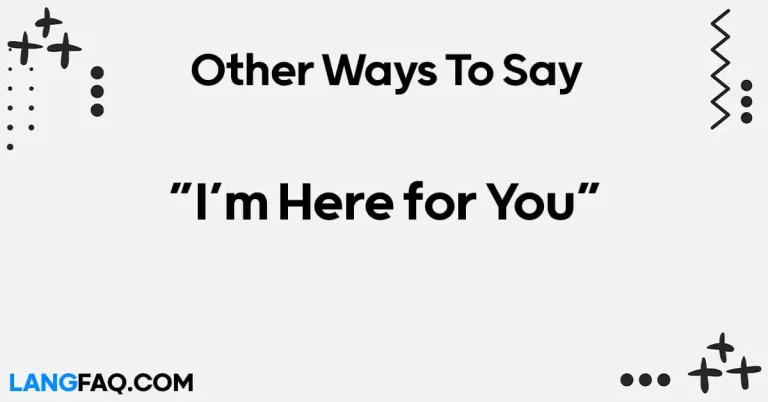
14 Other Ways to Say “I’m Here for You”
Share this post: Facebook X Pinterest In a world where expressing empathy and support is essential, finding new ways to say “I’m here for you” can make a…
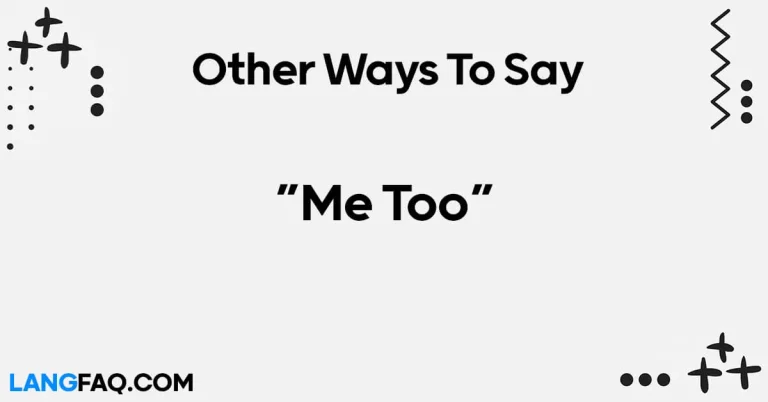
12 Other Ways to Say “Me Too”
In our daily conversations, expressing agreement or solidarity is essential for effective communication. However, constantly repeating “Me Too” might sound monotonous. Fear not, as we delve into 12…
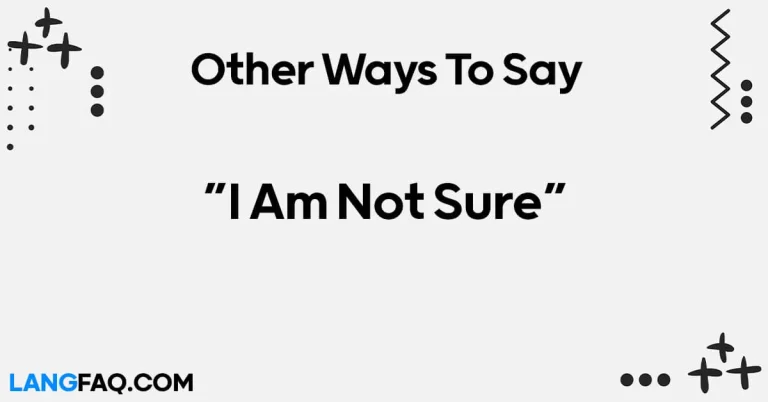
12 Other Ways to Say “I Am Not Sure” Professionally
In the dynamic landscape of professional communication, expressing uncertainty is inevitable. Mastering the art of conveying uncertainty with finesse is crucial for effective workplace interactions. This article unveils…
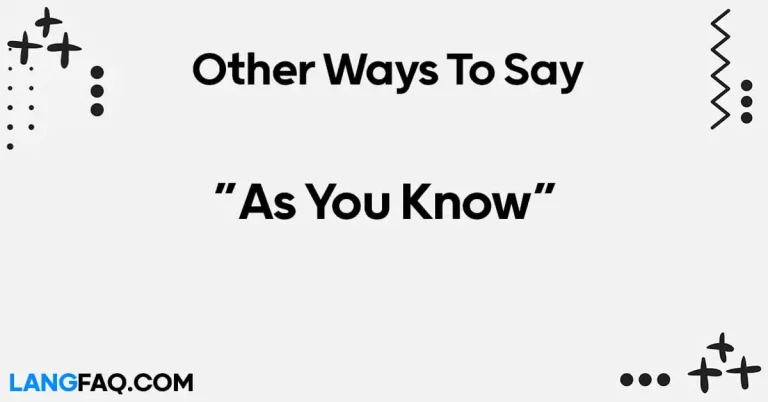
12 Other Ways to Say “As You Know”
Effective communication is the cornerstone of successful interactions. One crucial aspect is the ability to express familiarity without resorting to clichés. In this article, we’ll explore 12 alternative…
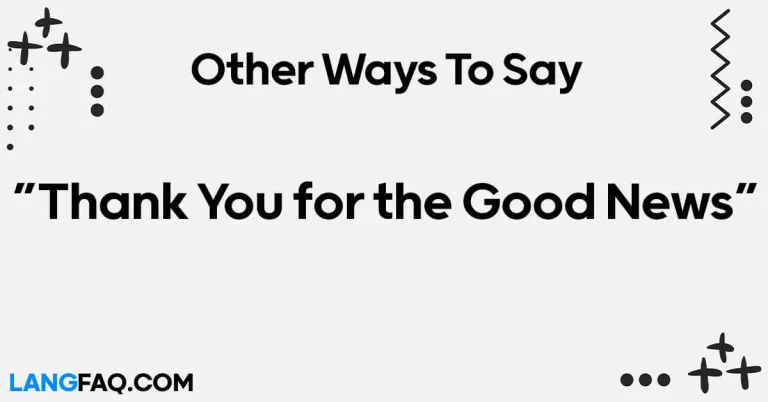
12 Other Ways to Say “Thank You for the Good News”
Welcome to a journey of gratitude where we explore diverse ways to express appreciation for good news. In our fast-paced lives, it’s essential to go beyond a simple…
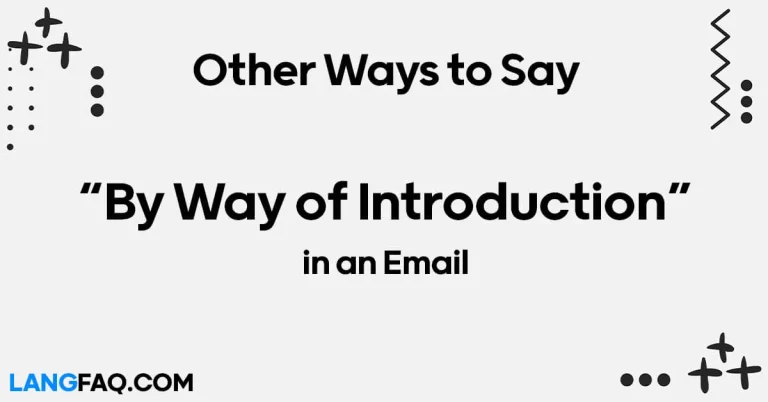
12 Other Ways to Say “By Way of Introduction” in an Email
In the realm of professional communication, the way we introduce ourselves sets the tone for meaningful interactions. Mastering the art of varied introductions can make your emails more…

9 Formal Synonyms for “This Shows”
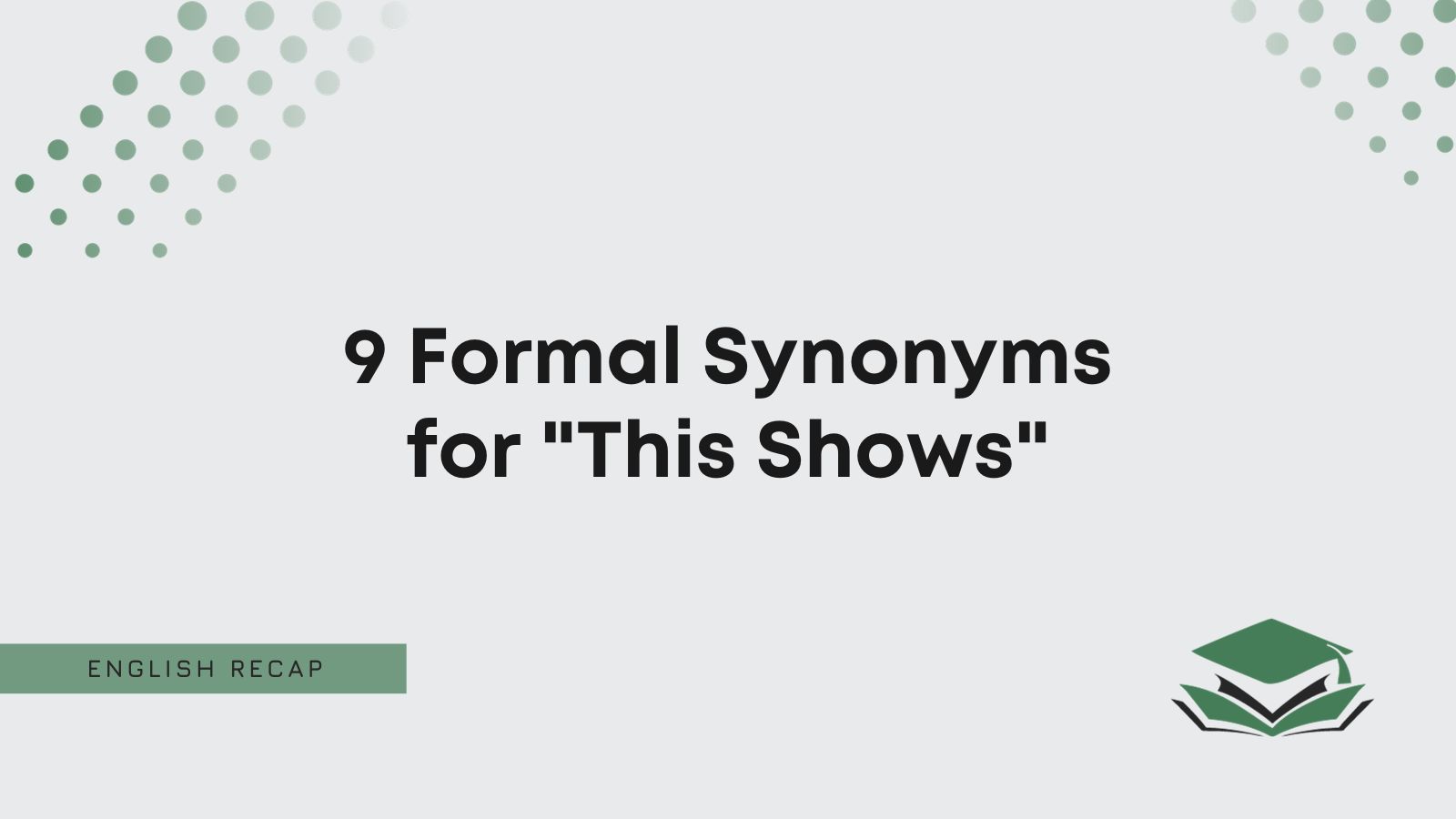
Do you want to discuss how one sentence confirms a thought or idea in another sentence?
Perhaps you’re worried that “this shows” doesn’t work too well in an essay because it’s informal or rude.
Well, you’re in luck!
This article will teach you other ways to say “this shows” to keep your writing interesting.
Is It Formal to Say “This Shows”?
It is formal to say “this shows.” You can use it in academic writing because it helps you to confirm how one sentence relates to another.
It’s also professional . Therefore, it’s always a good choice in essays.
However, you should be careful using it too much. Oversaturating your essays with “this shows” can take away from their impact and cause your essay to sound repetitive and boring.
Feel free to review this example to learn a bit more about it:
It’s clear that this is the best way forward. This shows that no other solution was reasonable to consider.
- It’s formal and direct.
- Readers will understand that you’re relating your sentence back to a previous one.
- It can very quickly become repetitive and boring.
- It’s not the most imaginative phrase to use to link sentences.
So, it’s clear that “this shows” works well in your writing. But that doesn’t mean you should limit yourself to using it as your only option.
Keep reading to learn other words for “this shows” in an essay. We’ve touched on some of the best synonyms to give you a better idea of what will work.
What to Say Instead of “This Shows”
- This demonstrates
- This illustrates
- This signifies
- This indicates
- This confirms
- This conveys
1. This Demonstrates
We recommend starting with “this demonstrates” to show you’re talking about something from the previous sentence.
It’s a great way to keep things formal and informative . Therefore, you can use it when filling out an essay or completing a passage of text that might benefit from linked sentences.
For the most part, if you can demonstrate how one thing leads to another, it’s good writing. After all, it’ll help readers to understand what you’re saying and how to make connections in your work.
You can refer to these essay samples to learn a bit more about it:
It’s clear what needs to be done. This demonstrates the resolve required to complete a task like this one.
We only had one option. This demonstrates that every other possible outcome has been expended and made impossible to continue.
2. This Illustrates
Next, we recommend writing “this illustrates.” It’s another way to say “this shows” that helps you to mix things up and sound less repetitive when you want to.
Generally, it’s a good formal synonym that shows why your previous sentence links to a new one.
It’s an effective way to engage a reader . It’s also professional and direct , so it’ll keep readers involved when they’re going through your essay.
Also, it’s worth reviewing these examples to learn more:
I’ve included all the findings to show you what I mean. This illustrates that there are still a few ways for me to continue with this.
This illustrates how simple it is to make it work. However, it’s going to take a few extra pairs of hands before we can start doing anything more.
Next, we want to mix things up a little bit. Rather than only focusing on academic writing, we also recommend using some of these synonyms in an email.
For instance, “showing” can work really well to link your email to itself.
But how does that work?
Well, you can use “showing” in the middle of a sentence to professionally explain why you’re writing about something.
It’s good to use when contacting a coworker . After all, you can explain your thought process and let them know more about what you’re thinking and what it “shows.”
Also, “this shows” and “showing” are nearly identical in usage. However, you must never forget you can’t start a sentence with “showing.” It must be placed in the middle of a sentence.
If you’re still unsure, perhaps this email sample will help you:
Dear Michael, I’m going to do it like this, showing that it’s still possible to complete the tasks without them. Please advise me on what you think is the best way to move forward. Yours, Brian Renshaw
4. This Signifies
Back to essays, we recommend writing “this signifies” as well. It teaches you how to say “this shows” in an essay when you’re trying to mix things up.
For the most part, this keeps things professional and clear . Therefore, it’s a great way to explain how things work or connect with each other.
Readers and reviewers will certainly appreciate including phrases like this.
That’s why we recommend using it in academic writing, as it’s bound to impress your professor if you want to.
After all, if they’re grading your work, it’s good to show that you know what you’re talking about.
As always, try not to repeat it too much! It can very easily make your essay sound repetitive if you’re not careful, which is never a good idea.
Also, you can check out these examples to learn a bit more:
As you can see, there are a few errors to discuss. This signifies that things still need to change before we can keep moving forward.
This signifies what could happen if things are left unattended. That’s why it’s important for us to break through quickly.
5. This Indicates
If you’re still unsure how to say “this shows” in an essay, try using “this indicates.”
It’s a great synonym that teaches you more about the things that work well in your writing.
After all, the more you explore your alternatives, the better your work will look. The last thing you want to do with your essays is make them repetitive and samey.
Readers will engage more when using phrases like this.
Here are some examples to also help you with it:
This indicates everything I’m trying to discuss with you. I think it’s important for you to pay attention to what’s to come.
It’s clear what I have to do. This indicates that only one option is going to work in our favor, so we must be prepared.
6. Implying
Next, we recommend writing “implying” instead of “this shows.” Again, this is a good one to use in the middle of a sentence .
So, we recommend writing it when explaining how one situation leads to another in the same string of text.
It’s good in academic writing as it’s quite professional and clear .
You can review these examples to see more about how to use it:
The statistics have made the situation more clear, implying that we need to make drastic changes quickly.
This is how it will work, implying that someone is going to need to step up to ensure things go that way.
7. Suggesting
Another good choice in academic essays is “suggesting.” This works in the middle of a sentence by showing how one idea suggests that another can happen.
You can use it to keep the reader informed as you go through an essay.
The more links you make within your sentences, the more your essay will make sense to the people reading or grading it.
That’s why we like this as an option in most graded essays. However, you should still try to limit how often you use something like this.
Check out these examples to find out more about how it works:
I have looked into it and found nothing important, suggesting that this isn’t the right place to go.
It’s clear what we need to do next, suggesting that there are some options we have yet to explore.
8. This Confirms
Going back to an email alternative, we recommend trying “this confirms.”
It’s a great way to confirm or suggest information to the recipient. It also creates a clear and direct link between the two things you’ve mentioned in an email.
So, you can use it when writing to coworkers . It shows you’ve looked into a collaborative effort and noticed that one thing confirms another.
Here’s a helpful sample email to show you more about how to use it:
Dear Steven, I looked into the project we’ve got so far, but we need to make some changes. This confirms that Alice did not look at the notes properly. Best regards, Sean Bryce
9. This Conveys
Finally, you can use “this conveys” in your formal essays . It’s a good way to entice the reader and let them know you’re in control of your own narrative.
It’s a good way to convey or confirm information quickly.
It gets to the point and shows you’re happy to explain yourself further if someone still isn’t getting what you’re saying.
Here are some helpful samples to show you a bit more about it:
As you can see, the results are a bit skewed. This conveys that we have to work harder to narrow the gap.
This conveys exactly what we thought would happen. Therefore, more works needs to be done to improve.
- 10 Professional Ways to Say “Get Well Soon”
- How to Address Multiple Doctors (All Situations)
- 9 Ways to Say “Please Take Your Time” in a Formal Email
- 9 Polite Ways to Say “Well Noted” in an Email
We are a team of dedicated English teachers.
Our mission is to help you create a professional impression toward colleagues, clients, and executives.
© EnglishRecap
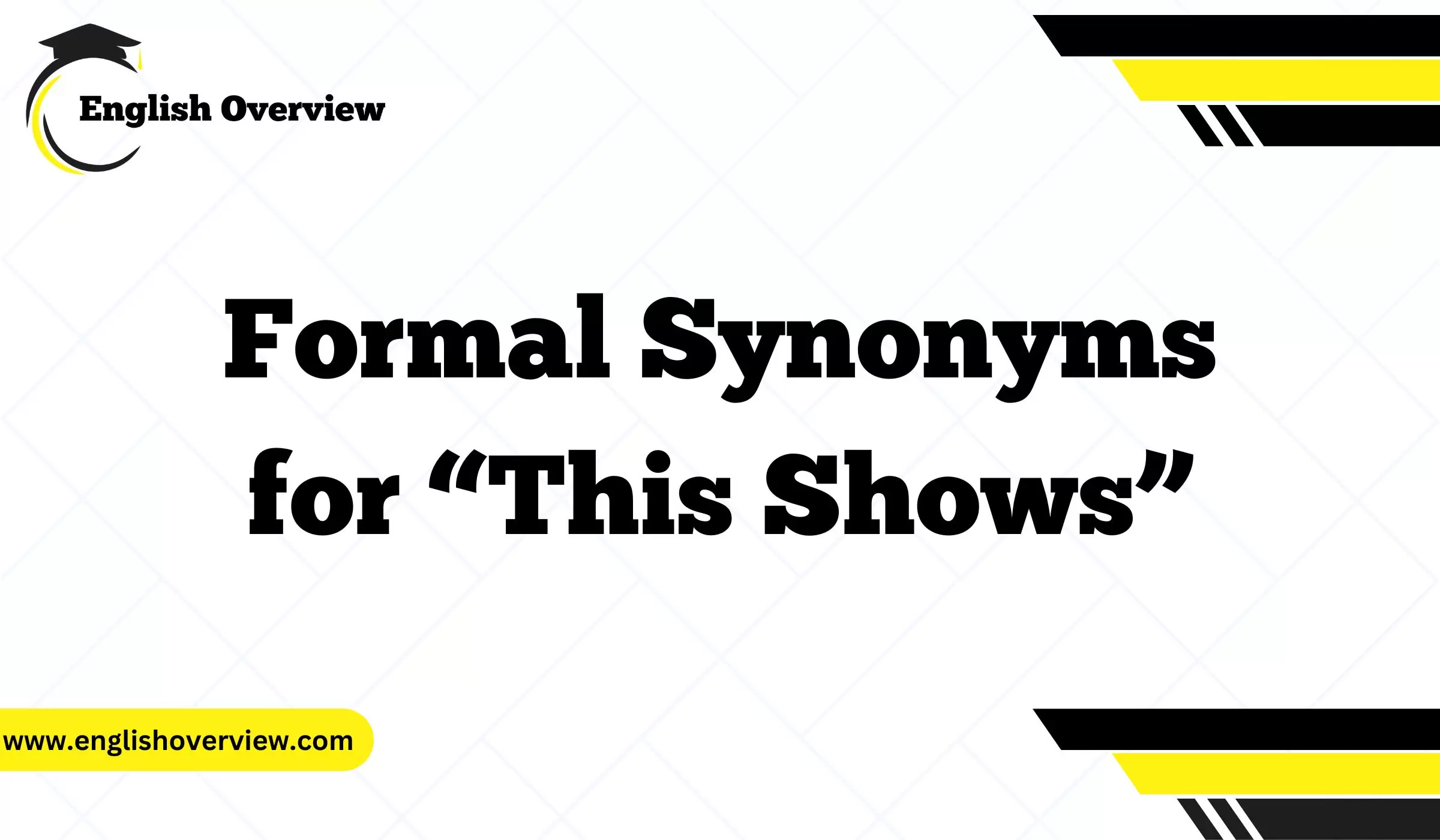
20 Formal Synonyms for “This Shows”
In the realm of formal language and academic writing, the ability to express ideas with precision and variety is paramount. Among the multitude of phrases that serve to convey the idea of demonstration or indication, “This Shows” stands as a fundamental phrase.
However, to add depth and sophistication to your discourse, it’s imperative to expand your lexicon. Here, we delve into twenty formal synonyms for “This Shows,” each accompanied by scenario examples to illustrate their usage.
List of Formal Synonyms for “This Shows”
- This illustrates
- This indicates
- This reveals
- This exemplifies
- This manifests
- This portrays
- This signifies
- This denotes
- This conveys
- This evinces
- This substantiates
- This proves
- This suggests
- This attests
- This confirms
- This bespeaks
- This represents
- This displays
- This exhibits
- This elucidates
This Demonstrates

In formal discourse, “This Demonstrates” serves as a potent phrase to underscore the clarity and evidence behind an assertion. It signifies a concrete manifestation of a concept or argument.
Scenario Example:
Dear Royal,
I hope this email finds you well. I am writing to discuss the recent market analysis. Our comprehensive research indicates a significant shift in consumer preferences towards sustainable products. This demonstrates the growing importance of eco-consciousness in our target demographic.
Best regards, Oscar
This Illustrates
“This Illustrates” provides a visual metaphor for elucidating a point or concept, often invoking vivid imagery to enhance understanding.
I trust this message reaches you in good spirits. I wanted to draw your attention to the recent survey findings. The data illustrates a clear correlation between employee satisfaction and productivity levels.
Warm regards, Oscar
This Signifies
“This Signifies” implies a deeper meaning or implication beyond the surface level, highlighting the significance of a particular observation or phenomenon.
I hope this email finds you well. The latest financial report reveals a steady increase in quarterly revenue. This signifies a positive trajectory for our company amidst challenging market conditions.
Sincerely, Oscar
This Indicates
“This Indicates” suggests a logical inference or conclusion based on evidence or observation, guiding the reader towards a particular interpretation.
I trust you are doing well. Our recent survey results indicate a strong preference for online shopping among our target demographic. This insight underscores the need to prioritize our e-commerce strategy moving forward.
This Implicates
“This Implicates” suggests a nuanced association or involvement, often implying consequences or ramifications.
I hope this message finds you in good health. The investigation findings implicate a systemic flaw in our security protocols. This revelation necessitates immediate action to safeguard sensitive information.
This Suggests
“This Suggests” proposes a potential interpretation or hypothesis based on available evidence, inviting further exploration or consideration.
I trust this email finds you well. Our recent market analysis suggests a growing demand for personalized services among consumers. This insight presents an opportunity for us to tailor our offerings accordingly.
This Confirms
“This Confirms” affirms the validity or truth of a statement or proposition, providing assurance or validation.
I hope this message finds you in good spirits. The latest audit report confirms our compliance with industry regulations. This validation reinforces our commitment to excellence in governance.
This Conveys
“This Conveys” communicates a particular message or meaning, often through implicit or subtle means.
I trust you are well. The recent customer feedback conveys a sense of dissatisfaction with our current product offerings. Addressing these concerns promptly is paramount to maintaining customer loyalty.
This Evinces
“This Evinces” presents evidence or proof of a particular concept or assertion, demonstrating its validity or existence.
I hope this email finds you well. Our latest sales figures evinces a growing demand for premium services. This trend underscores the need for us to expand our upscale offerings.
This Substantiates
“This Substantiates” provides additional support or validation for a claim or argument, bolstering its credibility or persuasiveness.
I trust you are doing well. The recent study findings substantiate our hypothesis regarding consumer behavior. This empirical evidence strengthens our strategic planning efforts.
This Proves
“This Proves” asserts the validity or truth of a statement beyond doubt, offering conclusive evidence or reasoning.
I hope this message finds you well. The successful implementation of our new marketing strategy proves its efficacy in driving brand awareness and customer engagement.
Read More: Polite Ways to Say “Please Let Me Know What You Think”
This Attests
“This Attests” serves as a formal declaration or assertion of a fact or truth, often backed by evidence or testimony.
I trust this email finds you in good health. The client testimonies attest to the superior quality of our services. This affirmation reinforces our reputation as a trusted partner in business.
This Bespeaks
“This Bespeaks” implies or suggests something indirectly, often through subtle cues or indications.
I trust you are well. The recent market trends bespeak a shifting landscape in consumer preferences. This insight informs our strategic decisions moving forward.
This Represents
“This Represents” serves as a symbolic or emblematic portrayal of a larger concept or idea.
I hope this email finds you well. The recent acquisition represents a significant milestone in our company’s growth trajectory. This strategic move positions us for expansion into new markets.
This Displays
“This Displays” showcases or exhibits a particular quality, trait, or characteristic, often in a conspicuous or visible manner.
I trust you are doing well. The latest product demo displays the innovative features and functionalities that set us apart from competitors. This demonstration underscores our commitment to excellence in product development.
This Exhibits
“This Exhibits” presents or showcases a particular attribute, behavior, or characteristic, highlighting its salience or relevance.
I hope this message finds you well. The recent customer testimonials exhibit a high level of satisfaction with our services. This positive feedback reaffirms our dedication to delivering exceptional experiences.
This Elucidates
“This Elucidates” clarifies or sheds light on a complex or obscure topic, enhancing understanding or comprehension.
I trust you are well. The recent market analysis elucidates the underlying factors driving consumer behavior. This insight enables us to formulate targeted marketing strategies that resonate with our target audience.
Pros and Cons
Expanding your repertoire of formal synonyms for “This Shows” offers numerous benefits in formal writing and discourse. It enhances clarity, precision, and sophistication, elevating the overall quality of your communication . However, excessive reliance on formal synonyms may lead to verbosity or obfuscation, detracting from the clarity and accessibility of your message. Therefore, it’s essential to strike a balance and deploy these synonyms judiciously to maximize their impact while maintaining readability and coherence.
Diversifying your vocabulary with formal synonyms for “This Shows” enriches your language proficiency and enhances the effectiveness of your communication. However, remember to use them judiciously to maintain clarity and coherence in your writing.

Dariel Campbell is currently an English instructor at a university. She has experience in teaching and assessing English tests including TOEFL, IELTS, BULATS, FCE, CAE, and PTEG . With over a decade of teaching expertise, Dariel Campbell utilizes his knowledge to develop English lessons for her audience on English Overview.
Leave a Comment Cancel reply
You must be logged in to post a comment.
Welcome to The English Overview, where we help to improve your language skills. Explore lessons on words, sentences, punctuation, and more. Enhance your English fluency and easily create powerful expressions. Come along on a journey to become excellent in language.
Privacy Policy
Latest Articles

The Benefits of Online Therapy in Mental Health: A Comprehensive Guide
September 9, 2024

Payday Loans UK: A Comprehensive Guide

Benefits of Electric Radiators
© 2024 English Overview

100+ Synonyms for “Show” with Examples | Another Word for “Show”
If you’re looking to enhance your vocabulary and improve your writing skills, understanding synonyms is essential. In this article, we’ll explore the different synonyms of “show” in various contexts and provide example sentences to help you better understand how to use them.
Show Synonyms
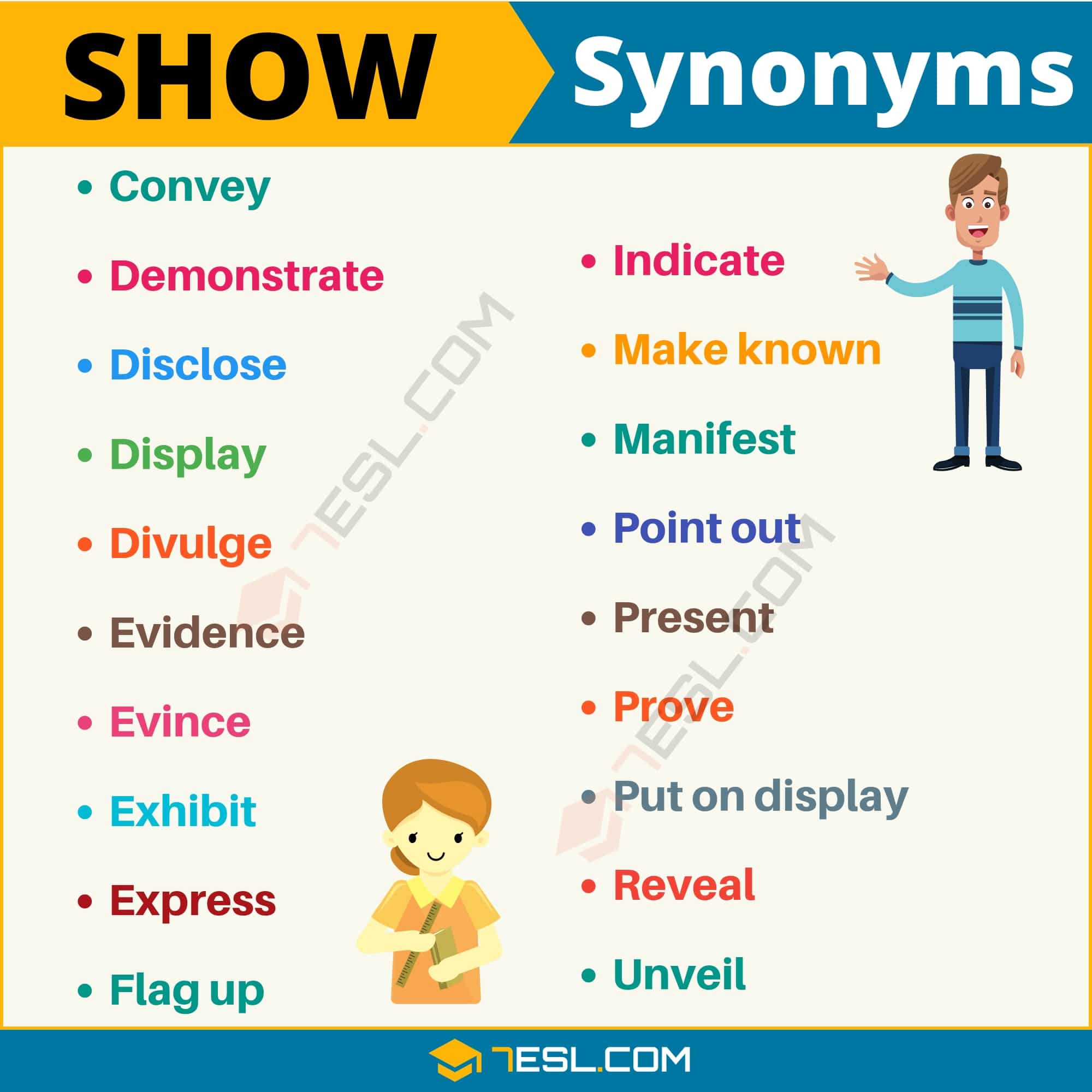
Show Meaning
“ Show ” as a verb means to display, exhibit, or present something to others, typically for the purpose of providing information, entertainment, or demonstration.
As a noun, “show” refers to a public exhibition or display, such as a performance, presentation, or event. It can also refer to a television or radio program, or a theatrical production. Additionally, “show” can indicate the act of presenting or displaying something to others.
List of synonyms for Show
- Corroborate
- Demonstrate
- Demonstrated
- Demonstration
- Entertainment
- Living room
- Ostentation
- Performance
- Presentation
- Put on display
- Show on the road
- Substantiate
Types of Synonyms for Show
To display or make visible, to demonstrate or prove, to feature or spotlight, to announce or make known, to display with emphasis, common synonyms for show, show vs. explain.
“ Show ” typically involves visually presenting something or providing a demonstration, while “ explain ” involves making something clear or understandable through verbal or written communication.
- The magician will show a new trick during the performance.
- Please explain the concept of photosynthesis to the class.
Show vs. Guide
“ Show ” refers to demonstrating or presenting something visually or physically, while “ guide ” involves leading or directing someone in a particular direction or course of action.
- She will show you how to solve the math problem step by step.
- The tour guide will guide the group through the museum, providing information about each exhibit.
Show vs. Lead
“ Show ” typically means to display or present something, either physically or metaphorically. On the other hand, “ lead ” often refers to guiding or directing others, or being in charge of a group or situation.
- The documentary will show the impact of climate change on local communities.
- She will lead the team to victory in the championship game.
Show vs. Instruct
“Show” generally refers to the act of exhibiting or presenting something, whether in a physical or metaphorical sense.
- During the experiment, the scientist will show the effects of the new drug on the lab mice.
- The manual will instruct you on how to assemble the furniture.
Synonyms for Show In Different Contexts
Art and entertainment.
- Perform: The orchestra will perform Beethoven’s Symphony No. 5 at the concert tonight.
- Present: The host will present the award for Best Actor at the ceremony.
- Demonstrate: The chef will demonstrate how to prepare the signature dish in front of the live audience.
- Stage: The theater company will stage a production of Shakespeare’s Hamlet next month.
- Exhibit: The museum will exhibit rare artifacts from ancient civilizations.
- Display: The art gallery will display the new collection of paintings by local artists.
- Expose: The art show will expose the hidden talents of emerging artists to the public.
- Broadcast: The radio station will broadcast the interview with the famous author next week.
- Stream: The music festival will stream the performances live on its website for global audiences to enjoy.
Communication
- Express : She used art to express her emotions in a powerful and moving way.
- Demonstrate: The science experiment will demonstrate the effects of heat on different materials.
- Articulate: It’s important to articulate your thoughts clearly during the debate.
- Convey: His smile conveyed a sense of warmth and friendliness.
- Impart: The teacher sought to impart knowledge and critical thinking skills to her students.
- Relay: Please relay the message to the rest of the team as soon as possible.
- Signify: The ringing of the bell will signify the start of the ceremony.
- Denote: The red traffic light denotes that it is time to stop.
- Symbolize: The dove is often used to symbolize peace and harmony.
- Depict : The artist will depict a historical event in his mural.
Business and Marketing
- Advertise : The company will advertise their new product on social media and television.
- Market : The company plans to market its new line of skincare products to a younger demographic.
- Spotlight: The marketing campaign will spotlight the innovative technology of our new smartphone.
- Showcase: The trade show will showcase our latest designs and product features to potential buyers.
- Launch: The company will launch its new line of electric vehicles next month.
- Unveil: The tech giant will unveil its latest smartphone model at the upcoming conference.
Academic Contexts
- Demonstrate : The study demonstrates the impact of climate change on migration patterns.
- Illustrate : Graphs in the report illustrate the statistical relationship between the variables.
- Expound : The author expounds on the theory with ample evidence from recent research.
- Explicate : The paper explicates the steps taken to ensure the integrity of the data.
- Develop : The discussion develops the initial idea by adding layers of complexity.
- Amplify : The researcher amplifies the significance of the findings through comparative analysis.
- Articulate : The theorist articulates the connection between economic and political systems.
- Disambiguate : The lecture sought to disambiguate the various aspects of the philosophical argument.
- Shed Light : Recent studies shed light on the mechanisms behind the phenomenon.
Absolute And Near Synonyms For Show
Absolute synonyms for show.
| Word | Meaning |
|---|---|
| Demonstrate | Showing how something works or is done, often to teach. |
| Present | To bring something to someone’s attention formally. |
| Illustrate | To make something clear by giving examples or providing visuals. |
Near Synonyms For Show
| Synonym | Meaning |
|---|---|
| Display | Show by putting in a place where people can see |
| Exhibit | Show publicly or formally |
| Reveal | Uncover or make known what was hidden |
Frequently Asked Questions
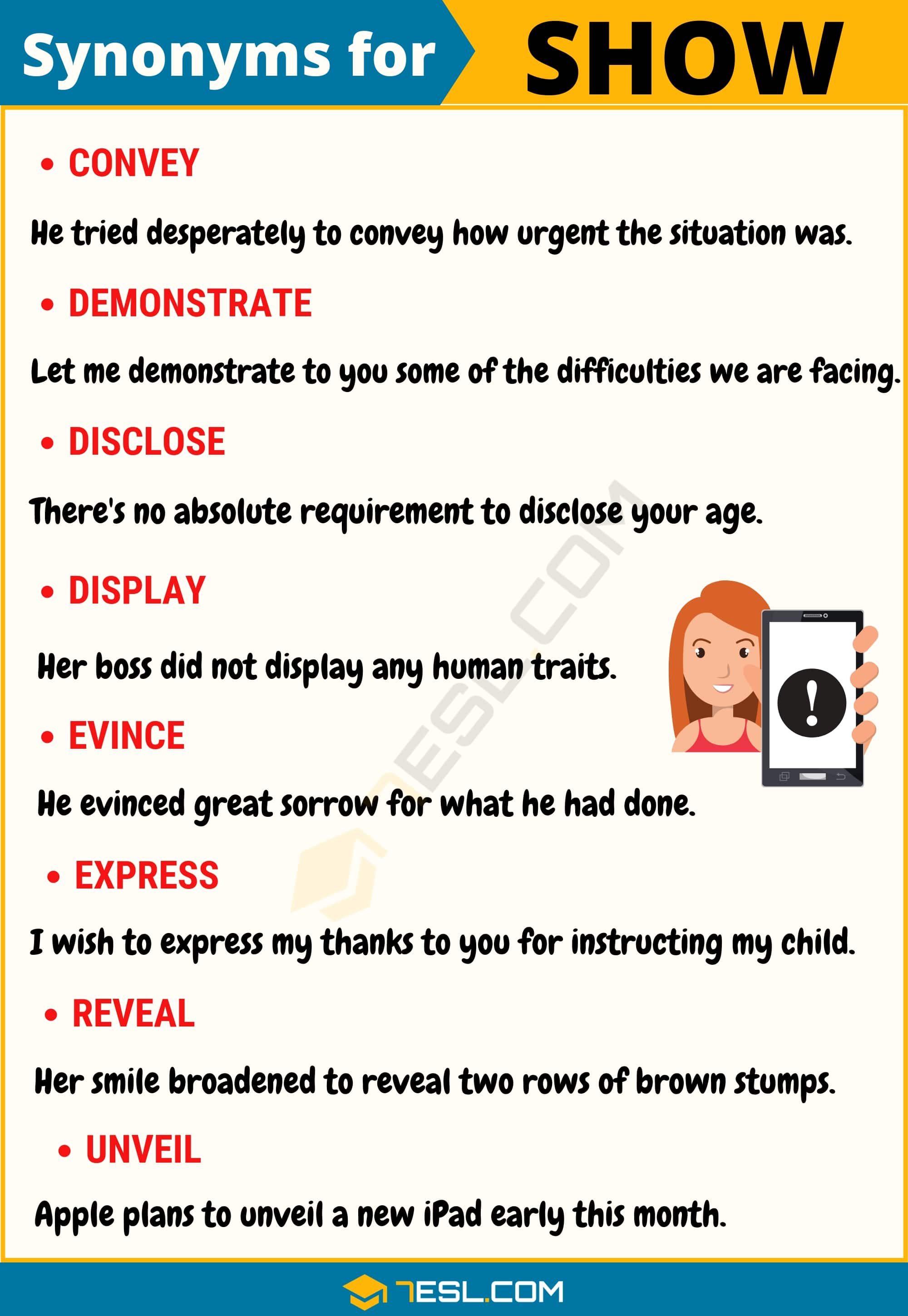
What alternative words can convey the same meaning as ‘show’ when used in writing?
In your writing, when aiming for variety, words like ‘display’, ‘exhibit’, and ‘reveal’ can serve as substitutes for ‘show’.
Which synonyms for ‘show’ are appropriate for academic or IELTS contexts?
For academic or IELTS contexts, ‘demonstrate’, ‘depict’, and ‘illustrate’ are preferred synonyms, as they convey a scholarly tone.
Can ‘exhibit’ replace ‘show’ in professional or formal settings?
Yes, ‘exhibit’ is often used in formal or professional contexts to suggest a deliberate display or presentation of information or artifacts.
What are the various synonyms for ‘show’ that can enhance presentation skills?
In presentations, using synonyms such as ‘present’, ‘demonstrate’, or ‘feature’ can add dynamism and clarity to your delivery.
- Create Synonym
- Develop Synonym
- Improve Synonym
- Ensure Synonym
- Latest Posts
- Judgement vs. Judgment: A Look at Spelling Variations - January 9, 2024
- Crochet vs. Knit: Understanding the Differences - January 5, 2024
- Metric vs. Imperial: What’s the Difference? - December 28, 2023
Instantly enhance your writing in real-time while you type. With LanguageTool
Get started for free
What Does “To Show” Mean and Which Words Can I Use Instead?
If you’re looking for synonyms for “to show,” we can help! We have five synonyms you can use in its place (plus example sentences that’ll show you how to use them).

What Are Some Synonyms for “To Show”?
- To demonstrate
- To disclose
What Does “To Show” Mean?
Show has numerous definitions and can function as a verb or noun.
As a verb, to show means “to display or allow something to be seen.” In this sense, to show proves helpful when writing an expository essay or any other type of text that requires a lot of explanation or clarification.
To show how the conclusion was reached, we have to first review two key pieces of data.
A pillar of good writing, however, is the use of varied vocabulary. Even if your writing requires a lot of explanation, don’t just rely on the verb to show —there are plenty of words you can use in its place.
Below, you’ll find five synonyms for to show.

“To Show” Synonyms
1. to demonstrate.
To demonstrate how this happened, a mini replica of the experiment was constructed.
Allow us to demonstrate the purpose of each strategically placed apparatus.
2. To present
To present the results as thoroughly as possible, two different programs were required.
We used a chart to present the results.
3. To reveal
To reveal why this happened, thousands and thousands of entries had to be analyzed.
The team used surveillance equipment to reveal where the pack of wolves was going at night.
4. To disclose
To disclose how the experiment concluded, we first had to provide our audience with general knowledge of artificial intelligence.
We needed to disclose several incidents that occurred.
5. To display
To display it accurately, a team of six designers worked on the exhibition.
The participants wanted to display their interpretations of the art.
Allow Us To Show You A Little Trick
Forgetting a word or not being able to think of more accurate synonyms are things that happen to all writers, regardless of how skilled. Luckily, we can always count on a quick online search to help us through these hindrances.
Why not save time and just double-click on a word to get a better synonym? That’s how it works with LanguageTool—an intelligent writing assistant that goes beyond correcting errors to enhance your text.

Besides correcting grammar, punctuation, and spelling errors and simplifying the synonym search process, LanguageTool can also rephrase your sentences to better suit the desired style. Give it a go!

Unleash the Professional Writer in You With LanguageTool
Go well beyond grammar and spell checking. Impress with clear, precise, and stylistically flawless writing instead.
Works on All Your Favorite Services
- Thunderbird
- Google Docs
- Microsoft Word
- Open Office
- Libre Office
We Value Your Feedback
We’ve made a mistake, forgotten about an important detail, or haven’t managed to get the point across? Let’s help each other to perfect our writing.
Save £500 when you enrol by 30th September!
- 40 Useful Words and Phrases for Top-Notch Essays

To be truly brilliant, an essay needs to utilise the right language. You could make a great point, but if it’s not intelligently articulated, you almost needn’t have bothered.
Developing the language skills to build an argument and to write persuasively is crucial if you’re to write outstanding essays every time. In this article, we’re going to equip you with the words and phrases you need to write a top-notch essay, along with examples of how to utilise them.
It’s by no means an exhaustive list, and there will often be other ways of using the words and phrases we describe that we won’t have room to include, but there should be more than enough below to help you make an instant improvement to your essay-writing skills.
If you’re interested in developing your language and persuasive skills, Oxford Royale offers summer courses at its Oxford Summer School , Cambridge Summer School , London Summer School , San Francisco Summer School and Yale Summer School . You can study courses to learn english , prepare for careers in law , medicine , business , engineering and leadership.
General explaining
Let’s start by looking at language for general explanations of complex points.
1. In order to
Usage: “In order to” can be used to introduce an explanation for the purpose of an argument. Example: “In order to understand X, we need first to understand Y.”
2. In other words
Usage: Use “in other words” when you want to express something in a different way (more simply), to make it easier to understand, or to emphasise or expand on a point. Example: “Frogs are amphibians. In other words, they live on the land and in the water.”
3. To put it another way
Usage: This phrase is another way of saying “in other words”, and can be used in particularly complex points, when you feel that an alternative way of wording a problem may help the reader achieve a better understanding of its significance. Example: “Plants rely on photosynthesis. To put it another way, they will die without the sun.”
4. That is to say
Usage: “That is” and “that is to say” can be used to add further detail to your explanation, or to be more precise. Example: “Whales are mammals. That is to say, they must breathe air.”
5. To that end
Usage: Use “to that end” or “to this end” in a similar way to “in order to” or “so”. Example: “Zoologists have long sought to understand how animals communicate with each other. To that end, a new study has been launched that looks at elephant sounds and their possible meanings.”
Adding additional information to support a point
Students often make the mistake of using synonyms of “and” each time they want to add further information in support of a point they’re making, or to build an argument. Here are some cleverer ways of doing this.
6. Moreover
Usage: Employ “moreover” at the start of a sentence to add extra information in support of a point you’re making. Example: “Moreover, the results of a recent piece of research provide compelling evidence in support of…”
7. Furthermore
Usage:This is also generally used at the start of a sentence, to add extra information. Example: “Furthermore, there is evidence to suggest that…”
8. What’s more
Usage: This is used in the same way as “moreover” and “furthermore”. Example: “What’s more, this isn’t the only evidence that supports this hypothesis.”
9. Likewise
Usage: Use “likewise” when you want to talk about something that agrees with what you’ve just mentioned. Example: “Scholar A believes X. Likewise, Scholar B argues compellingly in favour of this point of view.”
10. Similarly
Usage: Use “similarly” in the same way as “likewise”. Example: “Audiences at the time reacted with shock to Beethoven’s new work, because it was very different to what they were used to. Similarly, we have a tendency to react with surprise to the unfamiliar.”
11. Another key thing to remember
Usage: Use the phrase “another key point to remember” or “another key fact to remember” to introduce additional facts without using the word “also”. Example: “As a Romantic, Blake was a proponent of a closer relationship between humans and nature. Another key point to remember is that Blake was writing during the Industrial Revolution, which had a major impact on the world around him.”
12. As well as
Usage: Use “as well as” instead of “also” or “and”. Example: “Scholar A argued that this was due to X, as well as Y.”
13. Not only… but also
Usage: This wording is used to add an extra piece of information, often something that’s in some way more surprising or unexpected than the first piece of information. Example: “Not only did Edmund Hillary have the honour of being the first to reach the summit of Everest, but he was also appointed Knight Commander of the Order of the British Empire.”
14. Coupled with
Usage: Used when considering two or more arguments at a time. Example: “Coupled with the literary evidence, the statistics paint a compelling view of…”
15. Firstly, secondly, thirdly…
Usage: This can be used to structure an argument, presenting facts clearly one after the other. Example: “There are many points in support of this view. Firstly, X. Secondly, Y. And thirdly, Z.
16. Not to mention/to say nothing of
Usage: “Not to mention” and “to say nothing of” can be used to add extra information with a bit of emphasis. Example: “The war caused unprecedented suffering to millions of people, not to mention its impact on the country’s economy.”
Words and phrases for demonstrating contrast
When you’re developing an argument, you will often need to present contrasting or opposing opinions or evidence – “it could show this, but it could also show this”, or “X says this, but Y disagrees”. This section covers words you can use instead of the “but” in these examples, to make your writing sound more intelligent and interesting.
17. However
Usage: Use “however” to introduce a point that disagrees with what you’ve just said. Example: “Scholar A thinks this. However, Scholar B reached a different conclusion.”
18. On the other hand
Usage: Usage of this phrase includes introducing a contrasting interpretation of the same piece of evidence, a different piece of evidence that suggests something else, or an opposing opinion. Example: “The historical evidence appears to suggest a clear-cut situation. On the other hand, the archaeological evidence presents a somewhat less straightforward picture of what happened that day.”
19. Having said that
Usage: Used in a similar manner to “on the other hand” or “but”. Example: “The historians are unanimous in telling us X, an agreement that suggests that this version of events must be an accurate account. Having said that, the archaeology tells a different story.”
20. By contrast/in comparison
Usage: Use “by contrast” or “in comparison” when you’re comparing and contrasting pieces of evidence. Example: “Scholar A’s opinion, then, is based on insufficient evidence. By contrast, Scholar B’s opinion seems more plausible.”
21. Then again
Usage: Use this to cast doubt on an assertion. Example: “Writer A asserts that this was the reason for what happened. Then again, it’s possible that he was being paid to say this.”
22. That said
Usage: This is used in the same way as “then again”. Example: “The evidence ostensibly appears to point to this conclusion. That said, much of the evidence is unreliable at best.”
Usage: Use this when you want to introduce a contrasting idea. Example: “Much of scholarship has focused on this evidence. Yet not everyone agrees that this is the most important aspect of the situation.”
Adding a proviso or acknowledging reservations
Sometimes, you may need to acknowledge a shortfalling in a piece of evidence, or add a proviso. Here are some ways of doing so.
24. Despite this
Usage: Use “despite this” or “in spite of this” when you want to outline a point that stands regardless of a shortfalling in the evidence. Example: “The sample size was small, but the results were important despite this.”
25. With this in mind
Usage: Use this when you want your reader to consider a point in the knowledge of something else. Example: “We’ve seen that the methods used in the 19th century study did not always live up to the rigorous standards expected in scientific research today, which makes it difficult to draw definite conclusions. With this in mind, let’s look at a more recent study to see how the results compare.”
26. Provided that
Usage: This means “on condition that”. You can also say “providing that” or just “providing” to mean the same thing. Example: “We may use this as evidence to support our argument, provided that we bear in mind the limitations of the methods used to obtain it.”
27. In view of/in light of
Usage: These phrases are used when something has shed light on something else. Example: “In light of the evidence from the 2013 study, we have a better understanding of…”
28. Nonetheless
Usage: This is similar to “despite this”. Example: “The study had its limitations, but it was nonetheless groundbreaking for its day.”
29. Nevertheless
Usage: This is the same as “nonetheless”. Example: “The study was flawed, but it was important nevertheless.”
30. Notwithstanding
Usage: This is another way of saying “nonetheless”. Example: “Notwithstanding the limitations of the methodology used, it was an important study in the development of how we view the workings of the human mind.”
Giving examples
Good essays always back up points with examples, but it’s going to get boring if you use the expression “for example” every time. Here are a couple of other ways of saying the same thing.
31. For instance
Example: “Some birds migrate to avoid harsher winter climates. Swallows, for instance, leave the UK in early winter and fly south…”
32. To give an illustration
Example: “To give an illustration of what I mean, let’s look at the case of…”
Signifying importance
When you want to demonstrate that a point is particularly important, there are several ways of highlighting it as such.
33. Significantly
Usage: Used to introduce a point that is loaded with meaning that might not be immediately apparent. Example: “Significantly, Tacitus omits to tell us the kind of gossip prevalent in Suetonius’ accounts of the same period.”
34. Notably
Usage: This can be used to mean “significantly” (as above), and it can also be used interchangeably with “in particular” (the example below demonstrates the first of these ways of using it). Example: “Actual figures are notably absent from Scholar A’s analysis.”
35. Importantly
Usage: Use “importantly” interchangeably with “significantly”. Example: “Importantly, Scholar A was being employed by X when he wrote this work, and was presumably therefore under pressure to portray the situation more favourably than he perhaps might otherwise have done.”
Summarising
You’ve almost made it to the end of the essay, but your work isn’t over yet. You need to end by wrapping up everything you’ve talked about, showing that you’ve considered the arguments on both sides and reached the most likely conclusion. Here are some words and phrases to help you.
36. In conclusion
Usage: Typically used to introduce the concluding paragraph or sentence of an essay, summarising what you’ve discussed in a broad overview. Example: “In conclusion, the evidence points almost exclusively to Argument A.”
37. Above all
Usage: Used to signify what you believe to be the most significant point, and the main takeaway from the essay. Example: “Above all, it seems pertinent to remember that…”
38. Persuasive
Usage: This is a useful word to use when summarising which argument you find most convincing. Example: “Scholar A’s point – that Constanze Mozart was motivated by financial gain – seems to me to be the most persuasive argument for her actions following Mozart’s death.”
39. Compelling
Usage: Use in the same way as “persuasive” above. Example: “The most compelling argument is presented by Scholar A.”
40. All things considered
Usage: This means “taking everything into account”. Example: “All things considered, it seems reasonable to assume that…”
How many of these words and phrases will you get into your next essay? And are any of your favourite essay terms missing from our list? Let us know in the comments below, or get in touch here to find out more about courses that can help you with your essays.
At Oxford Royale Academy, we offer a number of summer school courses for young people who are keen to improve their essay writing skills. Click here to apply for one of our courses today, including law , business , medicine and engineering .
Comments are closed.















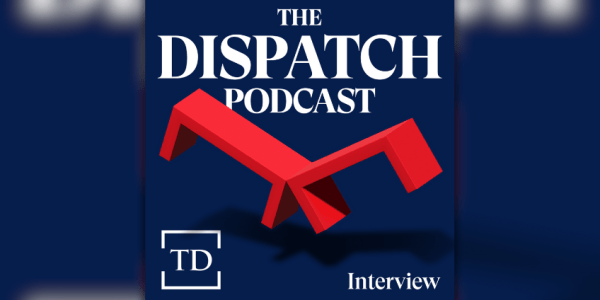

IMAGES
VIDEO
COMMENTS
Learn how to use different phrases to replace "this shows" in your academic writing. Find out the meaning, usage and examples of "this demonstrates" and "suggesting" as synonyms for "this shows".
Learn how to vary your language and express the same idea as "this shows" in different ways. See examples and explanations of 10 alternative phrases to use in formal and informal essays.
Find 199 words and phrases for this shows, such as demonstrates, illustrates, suggests, indicates, proves, and more. See examples and alternative expressions for this shows.
Learn how to link two ideas in an essay with different words than "this shows". Find out the meanings and examples of 10 synonyms for "this shows", such as showing, demonstrating, leading, creating, implying, proving, allowing, displaying, indicating and suggesting.
Learn how to use different expressions to articulate evidence or analysis in your essay. Find out the synonyms for "this shows" in formal and informal contexts, such as "this demonstrates" and "this suggests."
Embarking on the journey of expressive writing requires the adept use of language.Unveiling alternative phrases for "This Shows" can transform your essays into compelling narratives. In this article, we delve into 12 distinctive expressions, enhancing your ability to articulate thoughts with finesse.
Learn how to say "this shows" in different ways to avoid repetition and improve your writing. Find nine formal synonyms for "this shows" with examples and explanations for essays and emails.
Learn 20 formal synonyms for "This Shows" and how to use them in academic writing. See how to express ideas with precision and variety using phrases like "This Demonstrates," "This Illustrates," "This Signifies," and more.
In this article, we'll explore the different synonyms of "show" in various contexts and provide example sentences to help you better understand how to use them. Show Synonyms. Show Meaning ... In your writing, when aiming for variety, words like 'display', 'exhibit', and 'reveal' can serve as substitutes for 'show'. ...
Learn five synonyms for to show, such as to demonstrate, to present, and to reveal, and see how to use them in sentences. LanguageTool is an intelligent writing assistant that can help you find and rephrase synonyms for to show and other words.
Find different words for show as a verb or a noun, with definitions, examples, and antonyms. Explore synonyms of shows for various meanings and contexts, such as displays, poses, faces, exhibits, and more.
Learn how to write persuasive and intelligent essays with these 40 words and phrases that can help you explain, support, contrast and conclude your arguments. See examples of how to use them in different contexts and situations.
Find different words for shows in various contexts, such as exhibitions, spectacles, entertainment, programs, movies, and more. Browse synonyms for shows as nouns, verbs, and pronouns with examples and definitions.
Find different words and phrases for show, such as demonstrate, reveal, exhibit, present, and more. Browse the list of show synonyms by verb, noun, or adjective categories.
Find more than 1000 ways to say Shows with Power Thesaurus, the free online synonym dictionary.
Find 295 similar and opposite words for show, a verb or noun that means to present, display, reveal, prove, guide, steer, appear, or act. See definitions, examples, and related articles for each synonym.
Learn how to write essays with clarity and structure using words like firstly, secondly, thirdly, moreover, furthermore, etc. Find out how to introduce your argument, add information and flow, and conclude your essay with these academic phrases.
Find 247 different ways to say SHOW, such as appearance, display, fair, pageant, parade, and presentation. See definitions, examples, and related words for SHOW and its synonyms and antonyms.
I am writing many essays in preparation for my English Literature GCSE. I keep using the same words (presenting, showing, implying, conveying, portraying) ... Show 10 more. Latest. Trending. Last reply 9 hours ago. Year 9-2023-24. GCSEs. 51. 387. Last reply 1 day ago. Official Year 11 Chat Thread 2024-25. GCSEs. 28. 22.
Find 27 synonyms and antonyms for the phrase THIS SHOWS IN AN ESSAY, such as it is demonstrated, it is illustrated, or it shows. See examples of usage and related words for this phrase.
Words to use instead of show Flashcards
Find different words and phrases that mean show, such as appear, exhibit, or display, and their opposites, such as hide, conceal, or deny. Browse synonyms for show in various contexts and examples.
A Different Kind of Sunday Show Author Hannah Anderson created a bit of a stir on X this week, which even elicited a response from Republican vice presidential nominee and Ohio Sen. J.D. Vance. Her comments about Vance's positions on child care and family policy were also closely tied to her Dispatch Faith essay from last week.
Another way to say This Shows In An Essay? Synonyms for This Shows In An Essay (other words and phrases for This Shows In An Essay). Synonyms for This shows in an essay. 0 other terms for this shows in an essay- words and phrases with similar meaning. Lists. synonyms. antonyms. definitions. sentences.